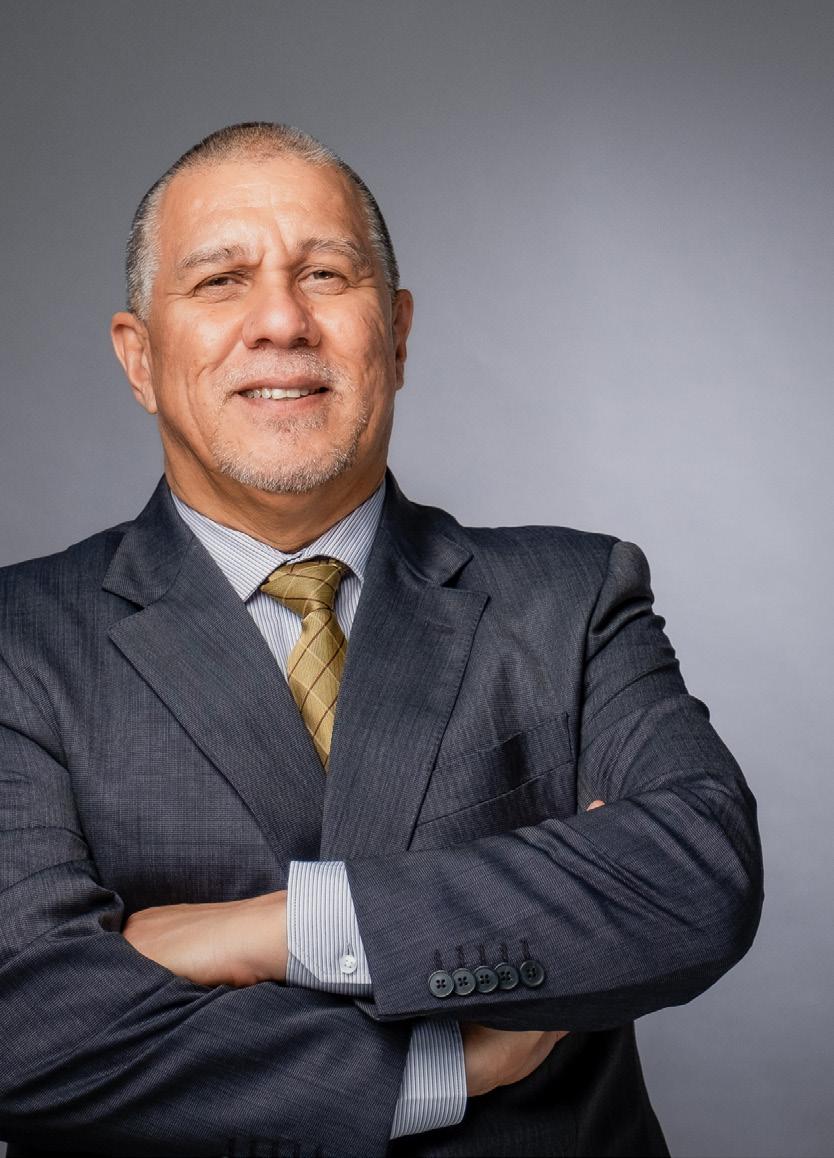








Becoming a leader in business is a significant achievement, and one which acknowledges your diligence and professionalism. At BMW Menlyn, we recognise the value of excellence, which is why we would like to introduce you to the exclusive benefits and preferential pricing that come with the BMW Professional Programme.

To learn more, please contact cathrine.mathebula@bmw-menlyn.co.za
BMW Menlyn
Corner Garsfontein Road and Lois Avenue
Tel. 012 426 2700
www.bmw.co.za/menlyn
In 1993, Leeser brothers, Christian and Achim, bought the nearly bankrupt FRABA (Fabrik elect. Apparate GmbH), a medium-sized, family-owned German company that specialises in industrial automation.
In their efforts to turn around FRABA, the brothers introduced a “total information, dynamic development and fair sharing” leadership model. This phenomenal story teaches us that leadership may mean many things to many people, but leadership is about people.
It is about vision, achievements, growth, development, sacrifices and making tough decisions. In fact, leadership is about creating a movement that is courageous enough to attract others and show them how to join the movement.
Thirty-five years ago, during the month of July, a group of professionals came together and established a movement, that movement was called the Southern African Institute of Government Auditors. It was a professional association within the office of the Auditor-General, and many then were courageous enough to follow the mission and pursue the idea at the time.
SAIGA! As we celebrate 35 years of this Institute’s existence, we need to highlight the role that visionary leadership has played in the establishment of the institution. It was great leadership that saw FRABA transformed to be a great firm with operations on three continents.
The founders of SAIGA had the vision to develop accountancy professionals who would specialise in public-sector auditing and finance. In this issue, we look back at the history of SAIGA through the perspective of two of its founding leaders, Prof Dieter Gloeck and Prof Herman de Jager.
As we celebrate our 35th anniversary, the two professors chronicle the events that shaped SAIGA into the professional body it is today, sharing their personal experiences, including the renaissance of SAIGA.
Our president, Phillip Rakgwale, talks about his journey with the Institute, and his achievements in the last four years and shares his vision as he begins his second term at the helm, following his re-election.
In the articles, we learn about talent management in the audit profession, the revised quality control element ISA 220, and about transparency and accountability through citizen-centric.
There is also a fascinating perspective on the mandatory audit firm rotation, in light of the court overturning a provision by SA's audit industry group requiring listed and public interest entities to rotate their auditors.
On the political front, we learn about the looming spectre of a coalition government and what that means for South Africa’s governance, as explained by former Sunday Times editor and columnist Peter Bruce.
The bumper edition also includes articles about the Public Finance Audit Performance, the perspectives on Reserve Bank monetary policy as well as how the developing world continues to be excluded from decision-making, from the Department of International Relations and Cooperation perspective.
You don’t want to miss out on the view of ASB about improving disclosures on going concern, and lastly why councillors must be held personally accountable for the cholera health crisis.
It was great leadership that brought SAIGA into our world, and it will be equally outstanding leadership that will carry the Institute over the next 35 years and beyond.

Enjoy reading this issue.
Russel Morena SAIGA CEO

My journey with SAIGA began nearly two decades ago, as I was sitting quietly in a university lecture hall.
As the Institute celebrates its 35th anniversary, I find myself reflecting not only on SAIGA's journey but also on my own relationship with the professional body and the tremendous career growth I have enjoyed as a result of the relationship founded on comparable strong principles and goals.
I can vividly remember Mishelle September, from the AuditorGeneral SA, walking into the lecture hall at the then Technikon Pretoria to present to us the SAIGA Training Scheme.
I soon found myself among a group of wide-eyed intakes shortlisted for the RGA training scheme. And before I knew it, I was well on my way to earning the (RGA) qualification.
In fact, we were the second set of trainees in the training scheme, which was based on a diploma and later degree in public finance and accounting at the Technikon.
The determination and desire I had to be part of the SAIGA Institute back then still burns today, albeit with a new goal as I begin my second term as SAIGA president this month.
I look back with pride at the achievements of the last four years during which we repositioned SAIGA to focus on both auditing and accounting disciplines with the public sector.
SAIGA achievements and initiatives include:
• Building strategic partnerships that will position SAIGA as the preferred professional body to serve the public interest. Several MOUs were concluded during the term to name a few, AGSA, PAFA, SALGA (Access to 254 Municipalities), Universities and other professional bodies.
• The institution has registered the public sector auditor qualification at the NQF 8, the first of its kind in the public sector both locally and globally. QCTO has accredited PSAAA to offer the qualification as the training provider.
• Building capacity within the broader public sector environment and expanding the institute’s presence within the SADC region. The institution has multiple relationships across Africa through its relationship with PAFA, Afrosai-E, INTOSAI, and recently the African Diplomatic Community. SAIGA has already achieved this goal of being a global institution, which is recognised on the international stage.
• For SAIGA to be the springboard for public sector financial management capacity creation in Africa.
• Building strategic partnerships and monetise these relationships with the relevant professional qualification and membership benefits.
• Membership numbers have increased from less than 500 members to over 1475 members to date and forever increasing.
• SAIGA is recognised in various media, online, print media and traditional media across all languages.
“A SAIGA JOURNEY OF A THOUSAND MILES BEGINS WITH A SINGLE STEP”
• In terms of our publications, our academic research journal, SAJAAR has been researched almost across 195 countries, read by 1458 readers per month and at least 70 subscribers per month.
• We have reintroduced the Auditing SA Journal/Magazine, which covers topical content including technical research relating to the public sector, specifically auditing and finance.
• Hosted two national conferences, making at least half a million per conference as well as numerous webinars and events, since the inception of the organisation.
• Establishment of the SAIGA Academy (PSAAA) with its independent board and investing at least R4 million in order as a commercial vehicle for SAIGA and a strategic partner to the public sector in capacity building.
• We are in the process of accrediting universities in terms of public finance programmes and offering our public auditor qualification. The organisation has also accredited audit firms to host our trainees, which has led to options for our trainees.

• The SAIGA new competency framework is the first framework in the public sector for finance professionals to professionalising the public sector.
• Progress has been made in the accreditation process with IRBA and SAQA for the registration of a performance audit
designation. The designation on performance audit designation is the first of its kind globally.
• The organisation has regional committees across the province, where SAIGA is promoted across the provinces and as vehicle of members taking part in the SAIGA Strategy implementation.
• SAIGA currently has seats in the ABASA Council and in the PAFA Advisory board, which is a significant achievement since the establishment of the organisation. >
Other key
initiatives achieved:
• Accreditation process with IRBA
• Certified Forensic Accountant (collaboration of 10 institutions)
• Accepted into the AntiIntimidation and Ethical Practices Forum (AEPF)
• Accepted into the Public Sector Audit & Risk Forum
• Fasset funding and LGSETA for the next 3 years to host trainees across the 9 provinces and across the sectors
• LTS system for SAIGA trainees
• Webinars (collab with UNISA, University of Bakircay)
• Introduction of two new professional designations
• Member of PAFA
The objective is for SAIGA to be recognised as a preferred professional body that advances capacity building and accountability in the public sector for all citizens within Africa and globally, to partner with the public sector to ensure that there is a sustained social impact in the lives of ordinary citizens.
This can be achieved through the enhancement of the relevance and standing of the profession and the Institute, to the benefit of society and to provide outstanding service and valued products to the members. As we look towards the next 35 years, we must ensure the professionalisation of auditing and accounting in the public sector by continuing with the programme in partnership with government Training outside public practice (TOPP) in key institutions. i.e.., Metros, Municipalities, Entities, SARS, National Treasury, FIC, PIC etc.).
The other avenue is to open for other auditing and accountants
in government to register for the SAIGA Programme to ultimately become RGAs. We will also open the programme for the public accountants in government to join the SAIGA programme to ultimately become the RGA and Certified Public Sector Accountants.
There is also a need to reintegrate the RGA Training Scheme back into the AGSA training programme, having closed all the previous gaps and having a solid undergraduate programme and post-graduate degree or programmes strictly based on the public sector finance needs and SAIGA.
Programme fundamentals and having a footprint and partnerships with universities and key accounting professional bodies include:
• Protecting the interest of the SAIGA profession in South Africa.
• Gaining market recognition for the profession with the industry and public sector.
• Providing technical leadership in public sector matters including participating in various platforms i.e., ASB Guidelines, Treasury Guidelines and Training Facilitations.
• Be a relevant and influential global player in the public sector auditing profession.
• Ensuring that the SAIGA footprint is on the development of the auditing profession on the African continent.
• Build and maintain strategic alliances and partnerships with other professional bodies within the industry and outside the industry and to be recognised as the leader in public sector auditing.
• Be sustainable financially by implementing turnaround revenue recovery strategies and discovering different revenue streams, i.e., training public sector courses. Create, cultivate, and maintain a cohesive, vibrant, and committed community of registered government auditors through its established forums.
The membership value will be increased through having the technical and thought leadership sessions at the regular SAIGA Conference to ensure that our members get enough CPD hours and see the value of being SAIGA members. We will support our trainee auditors who are in the AGSA and those who will be in the private firms to ensure that they are supported in terms of the training programme and having accredited trainee officers.
We are going to make sure our members are proud to be members of SAIGA to ensure that the membership package is increased and that there is a specific strategy for that. We will ensure that we have an agreement with National Treasury, Government Economic and Finance Cluster, and the security cluster to ensure that our members can train outside public practice and become registered auditors.
We will continue to contribute to the accounting profession by being highly ethical and contributing to the public sector accounting and auditing frameworks.
SAIGA will be a leading institute in the public sector in terms of influencing governance, public sector technical advisors, and trusted trainers of public sector professionals as a result of our research and member insights.

















The 400-odd members would attend the annual conference, the annual general meeting and pay their monthly membership fees.
An amended constitution for SAIGA was adopted at a special general meeting.
A Coat of Arms was also registered. SAIGA was also registered as a Public Benefit Organisation.
The Office of the Auditor-General officially recognised the RGA qualification.
The SAIGA registration of the Registered Government Auditors (RGA) was registered at the highest level with the South African Qualification Authority (SAQA). The Auditor-General South Africa (AGSA) recognised the qualification.

A post-University Training Model was introduced, a three-year qualification, referred to as Government Auditing Specialism Program (GASP).
A service-level agreement was signed with the Companies and Intellectual Property Commission (CIPC).
SAIGA were awarded the certificate of membership by Proudly South African.
The cradle of SAIGA was in 1988 when the staff members of the Auditor-General decided to move in a direction of a professional body.
The members decided that further steps should be taken to become a professional Institute. The Institute elected the executive chairman as well as the secretariat.
After the promulgation of the Public Finance Management Act in 2001 SAIGA developed short courses to enhance knowledge in the public sector.
The Southern African Journal of Accountability and Auditing Research (SAJAAR) was registered by the Department of Higher Education. Other publications soon followed such as Auditing SA, Spotlight and a Weekly e-com.
The Minister of Justice granted the right to SAIGA to act as Commissioners of Oath.
Common Body of Knowledge and Skills (COBOKS) was developed - a unique syllabus for government auditors.
SAIGA and the AGSA signed a Memorandum of Understanding. As a result, many professional staff in the office of the AGSA qualified as RGAs through a Recognition of Prior Learning Programme (ROPLO) and the writing of the RGA qualifying examination.
2008
SAIGA signed a Memorandum of Understanding with ISACA (South African Chapter).
The existing SAIGA constitution was amended at a special general meeting. The major amendments to the constitution were:
• The Executive President’s position was abolished and replaced by an elected Council and an executive committee (Exco).
• A Chief Executive Officer was appointed to run the Institute.
• More emphasis was placed on transformation.
• The amended constitution also strengthened the governance structure of the Institute.
The council appointed Meisie Nkau as its first black female President. Nkau guided SAIGA as it transformed into the new constitutional structures and processes.
An accounting firm was appointed to manage the finances of the Institute.
Signed a Memorandum of Understanding with SALGA, with an objective to provide members of both organisations and associates with access to a broader base of training and development courses, programmes, workshops, seminars, research and related activities.
Over 100 learners were enrolled for the GASP programme and over 200 trainee auditors were registered with SAIGA.
At the Special General Meeting, the constitution was amended in order to keep pace with the changes in the auditing profession. The major changes made were:
• The day-to-day operational requirements of the Institute were removed from the constitution and encapsulated in by-laws.
• The establishment of an education and training committee.
• The establishment of a formal disciplinary committee. Phillip Rakgwale was elected president of SAIGA.
SAIGA launches a strategic plan “2021-2024” towards the re-engineering of the Institute as part of the process to renew brand perceptions, stakeholder perceptions, and membership demand patterns and create competitive openings.

2023
The University of KwaZulu-Natal was accredited with SAIGA. The Institute accredited the first two audit firms, MGIRAS and LAGAB, in the history of SAIGA, and placed 40 RGA graduates with nine firms.
For the first eight years of its existence, the Institute operated very much like a club. It had just under 400 members who paid R20/month membership fees. The members were entitled to use the abbreviation “MIGA” - Member of the Institute of Government Auditors. This arrangement, however, had little or no effect, and almost anyone who performed the audit function in the Office of the Auditor-General could become a member. But it was a commendable start.
The Institute published an occasional newsletter and held an annual conference at which some guest speakers addressed various topics. I remember being one of these speakers - sharing my doctoral research findings on the audit expectation gap and auditor independence.
The first steps
The Southern African Institute of Government Auditors was founded on the 27th of July 1988 and its role was specifically designed to serve the public sector and to assist in the professionalisation of government auditors.'
The “almost” end of SAIGA By 1997, dark clouds were forming on the Institute’s horizon.
Whilst the government auditors had been working hard to professionalise, the same could not be said of the government accountants.
Government auditing had made huge progress to enhance the independence of government auditing through various structural and legislative interventions. The Office also engaged in an extensive training exercise to change oldfashioned audit approaches.
But now, in order to professionalise government accountants, the Institute for Public Finance and Auditing (IPFA) was established. With the support of the National Treasury, the Office of the Accountant-General and a substantial grant from the World Bank, funds flowed into IPFA. But little progress was made and


the fact that only a few accountants joined IPFA, hampered further advancement and support.

This led to the idea of dissolving SAIGA and transferring its membership base to IPFA. By doing this, IPFA’s membership base would instantly more than double –thereby ensuring further grants and financing for IPFA.
It was the most decisive point in SAIGA’s existence. To be – or not to be!
But SAIGA members were divided and many concerns were expressed.
However, with top management in favour of dissolution, it seemed a foregone conclusion that this would be the end of SAIGA. And it so came that in the middle of 1997, members of SAIGA were asked to vote on the matter.
It turned out that members voted decisively against dissolving SAIGA.
In the process, they conveyed a clear message: auditing and accounting need to be respected as separate functions and the independence of the external audit function may never be compromised. This is of crucial importance in the public
sector. In rejecting the merger with IPFA, SAIGA members accepted their responsibilities to stand up for the discipline: Auditing.
The first annual general meeting after the failed dissolution proposal was held in November 1997 and I was elected as the new Chairperson. A new EXCO was also elected and stock was taken of a badly battered and bruised Institute. The financial statements were delayed due to the dissolution process and when the accounts were eventually >
finalised it emerged that SAIGA was technically insolvent. Council and EXCO members had met frequently to discuss and decide on the dissolution issue, thereby incurring substantial travel and accommodation costs. The debt to the travel agent exceeded the money in SAIGA’s bank account.
As the top management in the Office was pro-dissolution, no assistance could be expected from this source. To add insult to injury, many staff in the Office resigned as they did not wish to be seen as “pro-SAIGA”.
With about 200 members left, the Institute was literally in ICU but without any medical aid or another lifeline. Its only possessions, a steel cupboard, desk, and a heap of boxes containing some files had been moved to and stored in the offices
of IPFA in anticipation of the dissolution.
SAIGA was not only insolvent, but it had no educational basis, a badly maintained membership register, and its constitution not only contained numerous impractical and costly stipulations, but its core provisions were not in harmony with our country’s new dispensation.
So, the process to revive SAIGA started in January 1998.
As part of my Doctorate in Auditing, I studied the functions and structures of regulating bodies extensively and visited many overseas institutes. These experiences would lay the foundations of a new SAIGA. To develop the Institute and
achieve growth, a special business model had to be developed and implemented, taking into account the small membership base and the depleted funds.

I will just mention some of the major initiatives and projects that were implemented. The reader will, no doubt, ask how anything could be done, considering SAIGA’s financial distress.
SAIGA’s initial revival rested on two pillars: lots of voluntary, charitable work by the Institute’s EXCO and the presentation of training courses in accounting and auditing fields. Every time a course was presented, and some funds were generated, these were applied to buy and put in place another building block to build the new SAIGA house and home for government auditors. You can imagine that this required
some fine-tuning and careful planning.
For the 18 years that I was at the helm of the Institute, SAIGA did not employ a single person. Apart from the charitable work by office bearers, SAIGA only paid for specific work done, linked to a specific deliverable.
Building blocks were put in place.Firstly, the Institute’s constitution was changed to embrace our country’s developments after 1994 and to introduce a cost-effectively practical business model for the 200 government auditors with resolute hope and lots of dreams of advancing government auditing.
Then the Common Body of Knowledge for Government Auditors (COBOKS) was developed – a unique syllabus for government auditors. This syllabus created the RGA (Registered Government Auditor) qualification which was then successfully registered with the South African Qualification Authority (SAQA) at the highest level (level 7 – the same as that of Chartered Accountants).
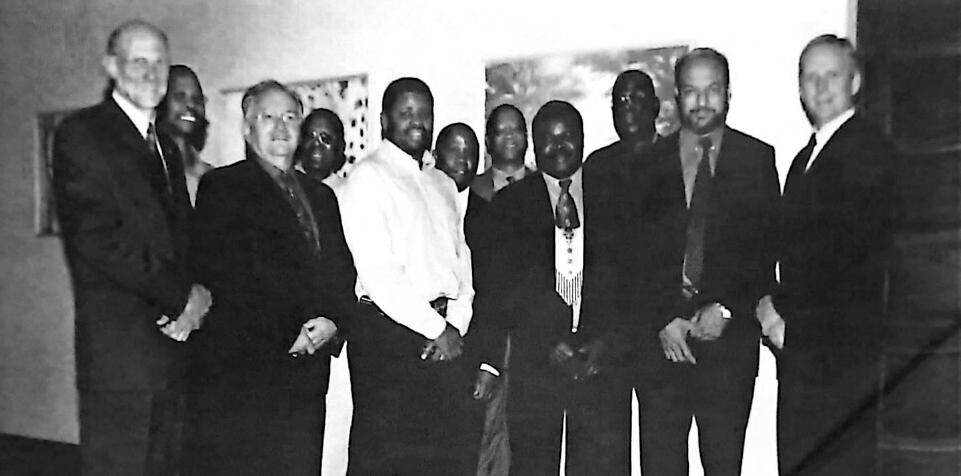
This provided for the first-ever qualifying examination in public sector auditing.
A proper identity was developed for the Institute, including a Coat of Arms registered with the Bureau of Heraldry. With it came logos and information brochures, RGA ties and scarves. The mission of the Institute embedded in this Coat of Arms
was: “Advancing Auditing and Accountability”. A SAIGA flag and banner and numerous other trademarks were registered.
SAIGA successfully applied and was registered as a public benefit organisation. Memorandums of Understanding (MoUs) were signed with the AG and other institutes.
A functional website, to support the RGA qualification, members activities and training interventions was developed, including online updated membership registers.
An extended corporate members’ base was acquired through a vigorous marketing and information campaign. With the promulgation and
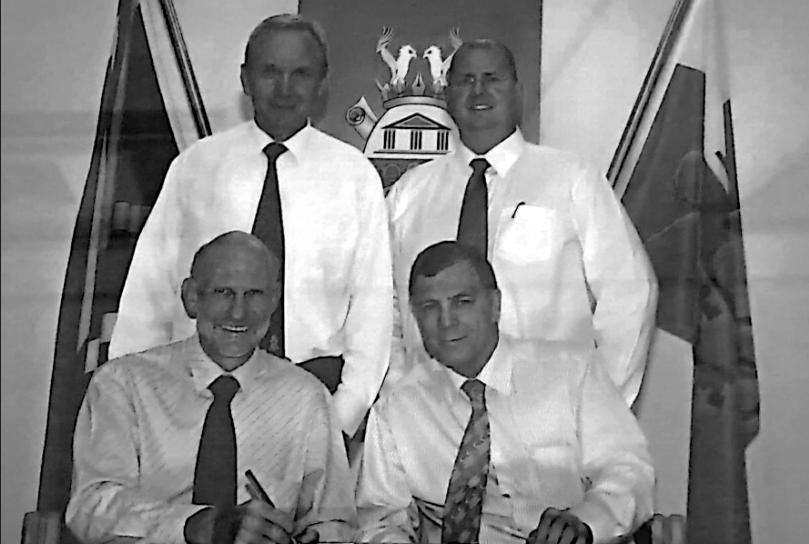
implementation of the Public Finance Management Acts (PFMA), SAIGA responded to a dire need for training in the public sector.
The Public Finance Management Academy was established and SAIGA soon became the preferred training provider for public finance management training. Its courses were accredited by National Treasury’s Validation Board.
The Annual Public Sector Reporting Award was introduced in 2001. This was SAIGA’s contribution to encouraging national and provincial departments to produce high-quality financial statements and to reward achievers in this field. >
Pictured from left to right: Prof Dieter Gloeck, Executive President of SAIGA; SAIGA Council Members: Mr Mcebisi Mpambani; Mr Raymond Potonas; Mr Alfred Khudu Bantseke; CEO of the AG-Office and Deputy Auditor-General, Mr Terrence Nombembe; SAIGA Council Members: Mr Mosikare George Gorekwang; Mr Nimrod Mqonqo; Mr Nimrod Mqonqo; Mr Ratshilumela Samuel Mukhathedzwa; Mr Muvhango Nevhutalu; The Auditor-General of South Africa, Mr Shauket Fakie and Prof Herman de Jager, Secretary of SAIGA. Pictured from left to right: Sitting: Prof Dieter Gloeck (Executive President: SAIGA); Mr Eddie Pelcher (President: ISACA - SA Chapter) Standing: Prof Herman de Jager (Secretary: SAIGA); Mr Winston Hayden (Vice President: ISACA - SA Chapter)In 2001, SAIGA also undertook the first-ever Public Sector Fraud survey – its results empowering public sector entities and government departments to design effective fraud prevention plans –a PFMA requirement.
Several publications were established:
• The Southern African Journal of Accountability and Auditing Research (SAJAAR), accredited with the Department of Higher Education.
• Auditing SA, a semi-scientific journal to stimulate and facilitate debate on auditrelated topics.
• A monthly publication Spotlight, which would focus on a topical aspect and provide extended reference and reading lists for its members to assist them with their continued professional educational development.
• SAIGA e-com. An electronic weekly newsletter which keeps readers up to date with the latest national and international developments in the field of auditing, accounting and accountability.
By now, the auditing and accounting professions in both the private and public sectors were becoming aware, very curious, and even a bit envious of the new role player.
As the finances improved, SAIGA moved to larger offices, reflecting a professional image and enabling the expansion of services.
Following the SAQA registration of the RGA qualification, in 2003 the Auditor-General recognised the RGA as one of only four professional
qualifications in the office.
Since accounting and auditing courses at South-African universities were strictly private sector orientated, a postuniversity training course model was introduced: The Government Auditing Specialism Programme (GASP). Successful completion of GASP was a prerequisite to writing the RGA-QE – SAIGA’s own three-part qualifying examination.
A formal three-year training period, monitored by SAIGA was implemented – a prerequisite to becoming an RGA.
After numerous submissions to the Minister of Trade & Industries, RGAs were given the right to act as Accounting Officers. A servicelevel agreement was signed with the Companies and Intellectual Property Commission (CIPC).
The Minister of Justice granted Registered Government Auditors the right to act as Commissioners of Oath. Formal continued professional development (CPD) requirements were prescribed for its members and monitored by the Institute.
In 2006 and 2007 a large number of professional staff in the Office qualified as RGAs through a Recognition of Prior Learning Programme (ROPLO) and the writing of the RGA Qualifying Examination.
In the time span of 18 years, SAIGA had reinvented itself, changed the public sector auditing scene and
played a huge role in assisting the whole sector with the implementation of the PFMA. During that period, SAIGA’s Public Finance Management Academy trained more than 25,000 public sector managers.
In 2014 alone, over 100 participants were enrolled for the GASP programme, and over 200 trainee auditors were registered. Over 100 new RGAs had since qualified by writing the RGA-Qualifying Examination.
Since SAIGA’s renaissance in 1998, up to 2014, the total income generated from projects driven and managed by EXCO exceeded 40 million Rand. The funds so generated allowed SAIGA to function as an independent Institute and develop products and acquire assets to deliver a wide range of services to the advantage of its members, associates, and the general public.
By 2015 SAIGA had made huge advances in empowering members from designated groups to find a professional home. SAIGA then had 54% black RGAs and its trainee auditors were comprised of 98% black trainees (including 49% black female trainees). SAIGA was also a Level 1 Contributor (Highest Level) to B-BBEE. No other accounting or auditing institute or body, neither in the public nor the private sector came even close to these statistics.
In January 2015 my third five-year term as Executive President ended. With my family moving to the Cape, I handed over the baton to a new president.
APPLICATIONS TO STUDY THE FOLLOWING

POSTGRADUATE PROGRAMMES IN 2024 ARE NOW OPEN:




Internal Audit Manager: Moore
Southern Cape
professions resigned simply based on a re-evaluation of priorities and life.
Leaders in all professions are still dealing with the aftermath of a global pandemic. Although life is basically back to normal, all sectors and professions have experienced changes because of the pandemic.
One of these changes is the way employees define personal priorities and life goals. In 2021 and 2022 this change resulted in what was known as “the great resignation”, where many employees across most
Although this trend seemed to have plateaued in 2023, several organisations are still impacted by it and the auditing and accounting professions are no exception.

Accounting firms have also reported an increase in staff turnover. There have even been reports of an increase in audit trainee clerks quitting before their trainee contracts have been completed. These trainees change jobs and are even willing to accept the 6-month penalty imposed by SAICA.
Likewise, other sectors in this profession, such as internal auditors, have also been impacted by the great resignation. Chambers
(2022) highlighted that many internal audit functions are struggling to fill vacancies, as internal auditors are also making greater demands regarding “worklife balance” and a consideration of the “soaring costs of living”.
However, the pandemic and the subsequent “new normal” are not the only factors causing this trend. It would be foolish to ignore the generational effect. Over the last few years, Generation Z has entered the workplace.
The characteristics and the ways in which this generation defines work satisfaction and value in the workplace are distinctly different compared to previous generations. Mawhinney & Betts (n.d.) highlighted that Gen Z is characterised by greater demand for personalisation and diversity.
They tend to be less driven by salary and more motivated by interesting jobs, a place where they feel they belong and an environment that is sensitive to inclusion and diversity.

This impact is also felt in auditing professions. Chambers (2022) discussed how questions and concerns relating to “commuting to work”, “cost of living” and “worklife balance” are mostly coming
from the younger generations (Millennials and Gen Z).
In fact, Chambers argues that this has resulted in a generation gap between audit leaders and juniors. Many leaders in the auditing and accounting professions are even resenting juniors for demanding more flexibility, accusing them of a lack of commitment to the sacrifices traditionally required to climb the corporate ladder.
On the other hand, Millennials and Gen Z generally accuse their superiors of not “keeping up with the times” and not “understanding their values and life goals”. As these firms and organisations invest a great deal in these employees, new strategies should be sought to offset the effects of these new trends.
Five strategies that could be employed to ensure better talent management in the audit profession:
• Brainstorm strategies to better understand and empathise with the generations you are trying to recruit and retain. Understand that they have different values compared to yours, they grew up in a technological age, they value diversity more than you and they might be less respectful towards traditional authority. Leaders and managers should take the lead in bridging the generation gap. Specific focus should be placed on Millennials and Gen Z, understanding that even these two groups are not the same.
• Develop an internal strategy to support your employees that shows commitment toward employee growth, personal challenges and wellness. Train and equip managers to listen to and support staff. Introduce a wellness programme, where staff feedback is sought, and evident change results from it.
• Leverage technology to optimise remote working and to find a balance between allowing staff to have flexibility
and monitoring productivity and performance. Technologies such as CaseWare Cloud and even Microsoft Teams offer specific collaboration and workflow tools that can assist in this regard.
• Develop clear employee development strategies that provide distinct career pathways and guidelines as to how an employee will succeed and grow in the organisation. This will start with clear key performance indicators that take an employee’s personal career goals into account but will also require frequent conversations with employees, as well as training programmes and specific interventions in line with KPIs and personal goals. Accounting firms should understand that even audit clerks might have specific personal goals beyond what is required for their professional designation. For example, a young auditor might have a goal to obtain experience in private and public sector clients, when the firm’s clients are mostly in the public sector. In this instance, strategies such as secondments should be considered as part of the employee’s personal development plan.
• Assess the culture of your organisation and develop strategies to manage and attempt to change the culture where necessary. Examples include the organisation’s approach to ensuring inclusion and increased sensitivity to diversity issues as well as performance management matters to ensure a culture where commitment is
rewarded, and recognition is clearly shown. Changing culture is difficult, as it requires a shift in people’s attitudes and behaviour. This might not always be easy or even possible. However, the firm’s management and leaders need to decide what direction they want the firm to go and should then lead by example. If leaders change their attitude about something, their behaviour will follow and a consistent application of this can have long-term cultural effects for the entire organisation.
There are many factors causing challenges to recruit and retain competent auditors. Although many of these are beyond the organisation’s control, being proactive in the areas that an audit firm can influence, might be the difference between keeping and losing that valuable employee. The strategies mentioned above are not an exhaustive list, but merely a starting point. Audit firms and internal audit functions should develop clear tailor-made plans to address current recruitment and retention challenges. Ignoring the problem will only make it worse.

THEME: “Advancing auditing and accounting for the citizen and the future”
VENUE: Emperors Palace
DATE: 14 – 15th Sept 2023

REVISED ISA 220 QUALITY CONTROL ELEMENTS AND FRAUD

The current wave of auditing scandals has opened a debate among academics, regulators and the auditing profession on how to restore public confidence in corporate financial disclosures and fraud risk assessments.

The transparency and reliability of financial data play a key role in assessing the key risks in the securities market, banking industry, and society. The performance of high-quality audits can improve the reliability of financial information. Internal and external stakeholders both value audit quality.
The revised ISA 220 Quality Management for an Audit of Financial Statements establishes that the quality management system of an audit firm should consist of the following elements:
• Management and leadership;
• The firm's risk assessment methods;
• Relevant ethical requirements;
• Acceptance and continuation of client connection; and
• Specific resources; monitoring; information and communication.
Due to the importance of audit quality, the International Auditing and Assurance Standards Board (IAASB) issued quality control standards; the International
Standard
(ISQC) NO.1, and the International Standard on Auditing (ISA) No.220. Such standards include a set of quality control elements that must be implemented both at the audit firm level (i.e., ISQC1) and at the engagement level (i.e., ISA 220) including, for example, leadership responsibilities, assignment of the engagement team, engagement performance (i.e., direction, supervision, review) and documentation.
This article investigates whether auditor performance towards fraud risk assessment may be used to predict the efficacy of some of the ISA 220 quality control elements, focusing on management and leadership, as well as acceptance and maintenance of client relationships.
The Revised ISA 220 adds a new paragraph 34, "Differences of opinion," that stipulates that if there are different opinions in the team on specific problems or between them, the arrangements for resolving such a situation should reflect in the audit firm's quality control procedures. However, the project leader or manager is required to produce an audit report until all differences of opinion have been resolved.
In order to contribute to this discussion and to extend the current literature on audit quality measures, the researcher will investigate whether auditor fraud risk assessment can be relied upon as a direct measure or indicator for the effectiveness of some of the quality control elements established by ISA No.220, as well as identify the important elements (e.g., leadership, information and >
communication, and manager/ partner attention to the audit team).
Analysing the draft revised quality standards: ISA 220 (revised) Quality Management for an Audit of Financial Statements, the researcher can emphasise and recommend the following:
1 2 3 4
• audit firms need to review and modify their quality management policies and procedures at the firm level,
audit firms need to review and modify their quality management policies and procedures on the audit mission,
when conducting an audit, it is necessary to consider resources from the point of view of not only humans but also technological and intellectual resources,
greater attention should be paid to the audit procedures for checking the principle of going concern and subsequent events after the financial statements.
a high impact on audit reports. Finally, audit firms should apply the management by exception principle to save cost and time, and improve profitability even with lowered audit charges to clients.
Audit quality is regarded as one of the important factors that affect the credibility of financial statements and risk management processes. Users are more likely to demonstrate a high level of confidence concerning the information presented in financial statements if the audit of the fraud risk management is perceived to be of high quality. To remain competitive in today’s environment, audit firms must continue to improve the quality of audit services provided and maximize client satisfaction.
provided in tasks related to fraud risk assessment.
Furthermore, more research is needed to study and analyse quantitative measures of audit quality to provide a more comprehensive and representative set of measures that take into consideration the other ISA 220 quality control elements.
The proposed audit quality indicator, i.e., fraud risk assessment, could be more understandable and useful to auditors, audit committees and quality inspection units as they are more involved and have access to such matters rather than financial statement consumers.
Audit firms should also monitor and manage effectively and efficiently all the factors that have

Therefore, the audit quality of audit firms must be assessed to ensure that audit processes employed by audit firms are systemic, effective, and in accordance with ISA 220. Proper training for less experienced auditors should be
In conclusion, there should be more academic efforts aimed at developing direct measures of audit quality on fraud risk assessments. There is a need to develop measures to serve as indicators for the effective application of quality control elements set by ISA 220.
Audit quality is regarded as one of the important factors that affect the credibility of financial statements and risk management processes.
APPLICATIONS TO STUDY THE FOLLOWING

POSTGRADUATE PROGRAMMES IN 2024 ARE NOW OPEN: FOR






The collapse of many major corporates, such as Enron and WorldCom in the United States, has been attributed to poor audit quality and a perceived lack of auditor independence.
There are arguments both for and against mandatory auditor rotation. Proponents of auditor rotation argue primarily that rotation can remedy the potential reduction in auditor independence and the related declines in the quality of financial
reporting resulting from lengthy auditor-client relationships (Gavious, 2007).
In addition to pressures to retain the client, an extended relationship may cause the auditor to become complacent.
This could lead to substandard audits and/or auditors tending to agree with client preferences, which results in poor earnings quality (Myers, Myers, & Omer, 2003).
Proponents also argue that rotation would bring a fresh look at the firm’s financial statements which might increase the likelihood that the auditor will be able to detect misstatements and/or challenge questionable accounting practices.
In recent years, South Africa has seen some major high-profile accounting scandals that have brought attention to issues of external auditor independence and effectiveness, as well as audit regulator integrity.

Some notable audit failures include South Africa-listed global retailer Steinhoff International Holdings NV inflating its profits and assets in 2016 by ZAR 250 billion, becoming the largest accounting scandal in the market to date.
There was also South Africa’s largest sugar producer, Tongaat Hulett Ltd, overstating its 2018 equity by ZAR 3.5-4.5 billion; and the South Africa-based Gupta family, whose leaked conversations with several key state officials in 2017 led to a judicial commission of inquiry into the allegations of state capture under Jacob Zuma’s presidency.
These events implicated some of the country’s big four audit firms, including Deloitte and KPMG,
leading to an investigation by the Independent Regulatory Board for Auditors (IRBA), the country's audit regulator.
According to ISS data, as of 2021, 48.3% of South African listed companies had an audit tenure of 10 or more years, with the average audit tenure in South Africa being 17 years – mainly pulled up by some auditors with a tenure of over 50 years. The top ten companies with the highest audit tenure are shown in the table below. These represent almost half of the top 21 JSE-listed entities reported by IRBA in 2015 to have an audit tenure of over 50 years. The rest have already rotated their auditors since.
These failures highlight the >
importance of the anticipated audit regulatory changes effective next year. In June 2017, the South African accounting watchdog, the Independent Regulatory Board for Auditors (IRBA), implemented a new mandatory audit firm rotation (MAFR) rule. The MAFR rule requires audit firm rotation every 10 years, effective for financial years commencing on or after 1 April 2023. Audit firms become eligible for reappointment after a cooling-off period of five years.
The Supreme Court of Appeal (SCA) has since set aside a rule by SA’s audit industry body requiring listed and public interest entities to rotate their auditors every 10 years.
The May 31 ruling by the SCA found that the Independent Regulatory Board for Auditors (IRBA) did not have the power to force audit firm rotation as per the Mandatory Audit Firm Rotation Rule (MAFR) it introduced in June 2017, which became effective three months ago.“In safeguarding an auditor’s independence, we still believe that MAFR is the appropriate mechanism that strengthens
auditor independence. The court’s judgement against the IRBA in this matter was on a technical legal basis and did not bring into question the value and/or effectiveness of MAFR. Therefore, we stand by the principle of strengthening independence through regular rotation of firms,” IRBA CEO Imre Nagy was quoted as saying. IRBA has indicated that the setting aside of the MAFR by the SCA poses minimal risks to investors on a short-term basis as the majority of listed entities (91%) and public interest entities have already rotated audit firms, thereby minimising the risk of independence threats as a result of long tenure. The benefit of these rotations will be in effect for at least the next five to ten years.
“We will therefore work urgently with parliament and stakeholders to address the technical issue raised in the judgment,” IRBA said in a statement.
Nagy told Accounting Weekly that the IRBA will approach parliament to pass or amend legislation requiring MAFR. Despite
Opponents of auditor rotation (generally led by the accounting profession) argue that mandatory auditor rotation increases audit startup costs and increases audit failure risk. They argue that new auditors must rely more heavily on management estimates and representation in the initial years of an audit engagement (Myers et al., 2003).
As auditor tenure increases, the auditor learns more about the client and its business processes, allowing the auditor to reduce reliance
“In safeguarding an auditor’s independence, we still believe that MAFR is the appropriate mechanism that strengthens auditor independence.”
- Imre Nagy, IRBA CEO
on management estimation and representation, resulting in a more effective audit (Crabtree, 2004).
In other words, they believe that extended auditor-client relationships increase audit quality; the new auditor will not have the benefit of the client-specific knowledge of a previous auditor (GAO, 2003).
According to Lu & Sivaramakrishnan (2009), this poor knowledge of the new auditor hampers the effectiveness of the audit process and can result in a deadweight loss to society.
Management also tends to be opposed to mandatory auditor rotation, because they face the potentially disruptive, timeconsuming, and expensive process of selecting new auditors, and familiarising them with the organisations operations, procedures, systems and industry (AICPA, 1992).
Auditor rotation can take place at the firm or partner level. Mandatory audit firm rotation is still being
debated in most places, but audit partner rotation has been adopted in certain countries. The professional requirements in the U.S. state that the partner in charge of an audit engagement should be replaced at least once every seven years.

The Sarbanes-Oxley Act of 2002 further requires audit partner rotation at Audit Tenure, Auditor Rotation, and Audit Quality: The Case of Indonesia Asian Journal of Business and Accounting, 5(1), 2012 at least once every five years.
In the UK, audit partner rotation has been a requirement for many years, and in January 2003, the maximum period for rotation of the lead partner was reduced from seven to five years. Requirements for audit partner rotation have also been adopted in the Netherlands and Germany. In Japan, beginning in April 2004, audit partners and reviewing partners were prohibited from being engaged in auditing the same listed company over a period of seven consecutive years (Chen, Lin, & Lin, 2008). Regardless of the debate surrounding audit firm rotation, this audit firm rotation rule
was introduced in a few countries (Comunale & Sexton, 2005; Cameran, Di Vincenzo, & Merlotti, 2005).
Italy has adopted mandatory audit firm rotation, while Brazil has adopted mandatory audit firm rotation for banks and listed companies.
In conclusion, the quality of a financial statement's content will be enhanced if it is audited, and a qualified auditor expresses a judgement on its accuracy and fair presentation.
The audit’s quality will also be improved if the auditor is independent in mind and in appearance; that is if any breaches are discovered and reported by the auditor. A financial statement that is supported by an audit report is viewed as more qualitative than one that is not.
It will be viewed as such, however, if the financial statement offered an impartial, unbiased, true and fair assessment of the company's financial activity for each accounting period. To achieve this, the auditors’ independence must not have been compromised, and the expected audit quality must be improved by interest groups to the financial statements in general.
Opponents of auditor rotation(generally led by the accounting profession)arguethat mandatory auditor rotation increases audit startup costs and increases audit failure risk.





Over the past three and a half decades, SAIGA has consistently played a pivotal role in developing and advancing accounting and auditing in the public sector. Through certification and continuous professional development programmes, capacity building initiatives, knowledge sharing platforms, research, and partnerships, SAIGA has enhanced transparency, accountability, and good governance in the public sector and contributed to the efficient and effective utilisation of public resources. As you celebrate this significant milestone, we encourage you to reflect on the positive impact you have made and the countless professionals you have influenced throughout the years.
PAFA is proud to have SAIGA within our membership. We extend our heartfelt congratulations to SAIGA, its dedicated members, and its visionary leadership on this momentous occasion. May your journey ahead be filled with continued success, greater achievements, and an unwavering commitment to promoting transparency, accountability, and good governance in the Southern African public sector.
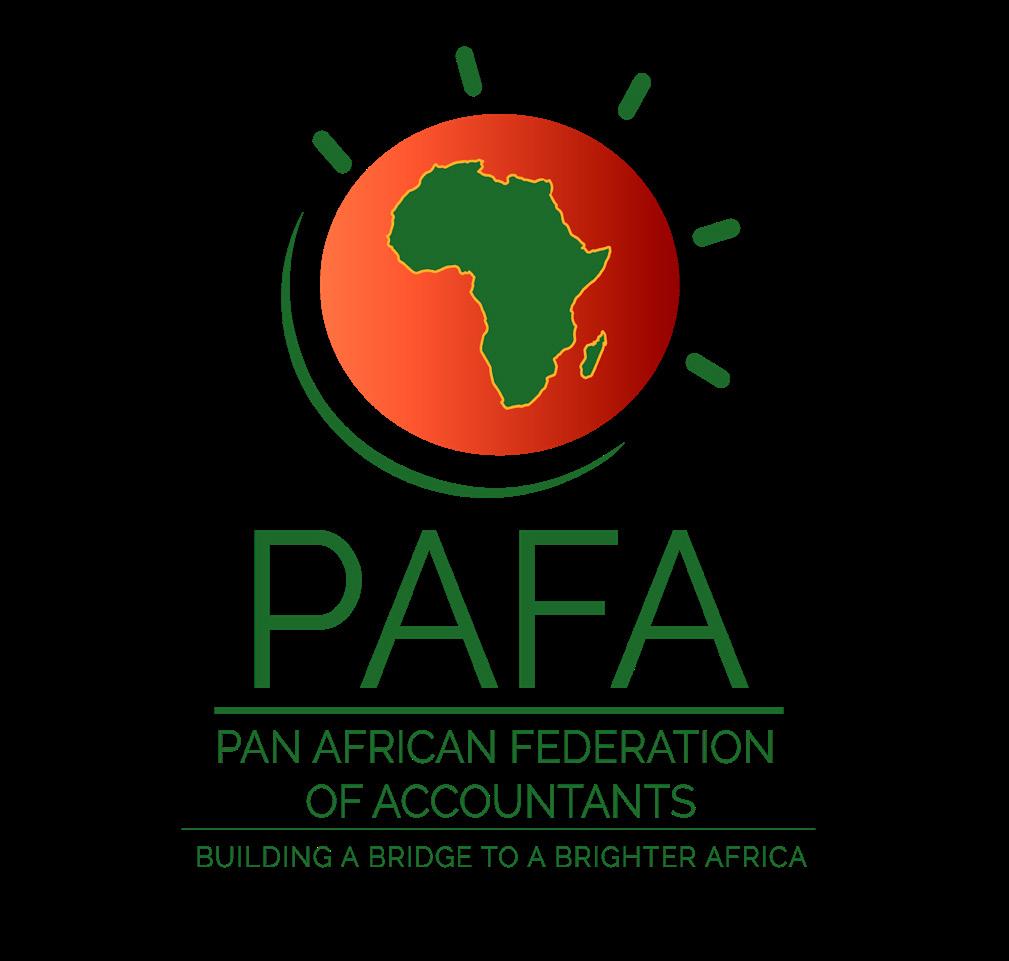 ALTA PRINSLOO CHIEF EXECUTIVE OFFICER, PAFA
ALTA PRINSLOO CHIEF EXECUTIVE OFFICER, PAFA
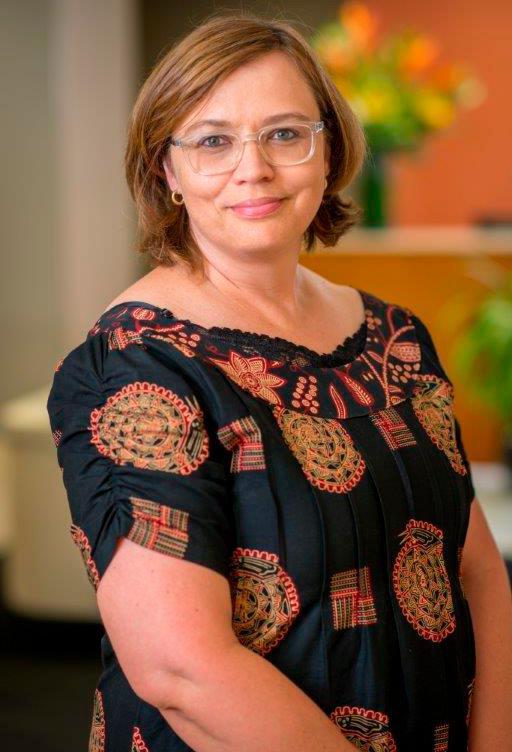
Nedbank is committed to being the business banking partner for the public sector. Our bigger-picture approach to banking is designed to provide groundbreaking solutions for your municipality. With the expertise and knowledge of our community specialists, we can ensure continuity, accessibility and quick decision-making that guides your business growth.
Think bigger.
Think Nedbank Commercial Banking.













For more information email us at publicsector@nedbank.co.za.


Over the past few years, South Africa faced several disruptions, such as COVID-19, protests and socio-political unrest that were characterised by widespread looting.
These disruptions, along with the current state of the economy and decreasing budgets, necessitate management to think ahead on how the entity will continue to meet service delivery objectives and financial obligations as and when they become due.

The Standards of GRAP on Presentation of Financial Statements (GRAP 1) and Events After the Reporting Date (GRAP 14) require
management to assess an entity’s ability to continue as a going concern when preparing its financial statements. When management is aware of any material uncertainties related to events or conditions that may cast significant doubt upon the entity’s ability to continue as a going concern (hereafter “material uncertainties”), information about these uncertainties need to be disclosed in the financial statements.
Audit standards set out auditors’ responsibilities relating to going concern. An auditor is required to evaluate management’s assessment of the entity’s ability to continue as a going concern by considering information over the same period as

that used by management. They are also required to ensure that management considered all the relevant information to make this assessment.
In a recent project to review going concern requirements, the Accounting Standards Board (the Board) observed that a limited number of entities disclose information in their financial statements on material uncertainties. The Board further observed that management is unsure if an entity’s financial statements should continue to the prepared on a going concern basis in certain circumstances. For example, when some or all of the entity’s functions are transferred to another entity through a transfer of functions or merger.
along with the following specific information about these uncertainties:
To address these observations, the Board agreed to provide further clarification in GRAP 1 and require additional disclosures. These are explained below:
New guidance on the application of going concern in the public sector GRAP 1 is clarified to explain that when a decision is taken to liquidate an entity, to cease its operations in its entirety, or when there is no realistic alternative but to do so, preparing financial statements on the going concern basis is inappropriate. This is because all the functions and operations of the entity will be terminated.
Preparing financial statements on a going concern basis remains appropriate where a decision is taken to transfer some, or all of an
entity’s functions to another entity, or to merge one or more entities. This is because the functions previously provided by the entity will continue to be provided, either by another entity, or in a modified form (the new combined entity).
Management should assess going concern separately when some of an entity’s functions are transferred, and others are discontinued.
New disclosure requirements relating to going concern GRAP 1 now specifically requires management to disclose its significant judgements and assumptions in assessing going concern. When management is aware of one or more material uncertainties in making this assessment, the fact that there are uncertainties should be disclosed,
• the principal events or conditions that gave rise to the uncertainties;
• the possible effect that the uncertainties may have on current and future reporting periods; and
• management’s plans to address the uncertainties and actions to mitigate the effect of the events or conditions giving rise to the uncertainties.
If information about management’s plans and actions to mitigate uncertainties is published elsewhere in the financial statements, a cross reference can be included to that information. Information need not be repeated in the notes to the financial statements.

Consequential amendments were also made to GRAP 14 to align with the amendments in GRAP 1.
AVAILABLE RESOURCES:
The additional guidance on the application of the going concern basis and the new disclosure requirements in GRAP 1 will be applied prospectively. The Minister of Finance must still determine the effective date.
Two Fact Sheets were developed to assist management with its going concern assessment:
• Fact Sheet #1 on Assessing Going Concern
• Fact Sheet #2 on Preparing Financial Statements on a Basis Other Than Going Concern
Effective public finance administration
is crucial for a country’s sustainable development and well-being. In South Africa, the government’s reputation has been tainted by reports of corruption and mismanagement, both locally and internationally. Examining the roles of ministers and their influence on audit performance is key to addressing these challenges.
This article explores the specific mechanisms through which the leadership of South African ministers impacts the financial performance of their departments, as revealed by audit findings.


By focusing on the South African context, this article aims to provide valuable insights into the leadership required to improve the responsible management of public resources.
It is necessary to evaluate the auditing system in South Africa in order to comprehend the impact of ministers on audit performance. The Auditor-General of South Africa (AGSA) and the Public Service Commission (PSC) perform critical responsibilities in examining government institutions' economic management practises. AGSA is a constitutionally autonomous entity responsible with auditing national and provincial governments, municipalities, and public entities.
They analyse public fund management by objectively evaluating financial statements, compliance with rules and regulations, and performance measures. AGSA conducts performance audits in addition to financial audits, with the goal of analysing the economy, efficiency,
and effectiveness of government programmes and projects. AGSA finds areas for improvement and makes recommendations to improve the stewardship of public funds through these audits.
The PSC is another crucial oversight body in South Africa. It is responsible for monitoring and evaluating the ethical conduct and performance of the public service. The PSC promotes good governance, ethical behaviour and accountability within government departments. By monitoring adherence to ethical standards, the PSC plays a crucial role in ensuring that ministers and public servants uphold the principles of transparency and accountability in managing public funds.
The collaboration between AGSA and the PSC is crucial for maintaining integrity and accountability in the management of public funds. AGSA's financial and performance audits provide valuable insights into the financial practices of government entities, while the PSC's monitoring and evaluation efforts help identify ethical lapses and promote good governance.
Together, they contribute to a comprehensive assessment of the role of ministers in audit performance and provide a foundation for improving the stewardship of public funds in South Africa.
The role of ministers in audit performance is multifaceted and can significantly influence the economic management >


practices of their respective departments. As key decisionmakers and leaders, ministers can shape policies, allocate resources and foster a culture of accountability. By understanding their role in audit performance, the public can gain valuable insights into how ministers impact the responsible management of public funds in South Africa.
proper feasibility studies or costbenefit analyses. As a result, several projects faced delays, cost overruns, and quality issues, leading to adverse audit findings and financial losses.

Resource Allocation and Budget Oversight: Ministers can allocate resources and oversee departmental budgets. Their decisions regarding the allocation of funds can significantly impact audit performance. For example, suppose a minister diverts resources from essential service delivery areas to projects with limited public benefit. In that case, it may result in audit findings highlighting inadequate resource allocation and inefficient use of public funds.
Policy and Decision-Making: Ministers hold significant authority over policy formulation and decision-making within their departments. Their choices and strategic direction greatly influence financial performance. For instance, a minister responsible for infrastructure development may prioritise projects aligned with their political agenda rather than those with the highest economic feasibility. This misalignment can lead to wasteful expenditure and negatively impact audit outcomes.
To illustrate this, in the AGSA Annual Report 2016/17, it was revealed that the Department of Transport, under the leadership of the minister in office, allocated funds to high-profile infrastructure projects without conducting
A case in point is the AGSA Annual Report 2018/19, which exposed irregularities in the Department of Education. In an attempt to appease certain interest groups, the minister diverted a massive portion of the department's budget to non-essential programmes, neglecting critical educational needs. This misallocation of resources contributed to bad educational outcomes and negative audit findings.
Leadership and Accountability: Ministers play a crucial role in fostering a culture of accountability within their departments. Their commitment to upholding ethical standards, transparency, and accountability sets the tone for the entire organisation. If ministers fail to prioritise these values, it can lead to a lack of financial discipline, irregularities and poor audit outcomes.
Conversely, ministers promoting accountability can drive positive change and improve audit performance.
An example can be found in the PSC Annual Report 2014/15, which highlighted the importance of ethical leadership in the fight against corruption. The report emphasised that ministers who demonstrate ethical behaviour and hold their staff accountable for financial misconduct significantly improve audit outcomes and strengthen public trust.
Furthermore, the AGSA Annual Report 2020/21 underscored the significance of leadership in addressing the root causes
The role of ministers in audit performance is multifaceted and can significantly influence the economic management practices of their respective departments.
of poor audit outcomes. It emphasised that ministers who lead by example and instil a culture of transparency and accountability throughout their departments are more likely to achieve positive audit results.
In Conclusion:
The influence that ministers wield through their policy and decision-making, resource allocation, and fostering a culture of accountability significantly impacts audit outcomes. Realworld examples from the AuditorGeneral of South Africa (AGSA) and Public Service Commission (PSC) reports demonstrate the tangible consequences of both practical and ineffective ministerial leadership.
To improve the stewardship of public funds, ministers must prioritise ethical practices, transparent economic management, and accountability. By setting policies aligned with the best interests of the general and sound economic principles, ministers can ensure the effective utilisation of resources.

By allocating funds strategically and responsibly, they can maximize the impact of public expenditure on essential services and programs.
By fostering a culture of accountability and transparency, ministers can instil confidence in managing public funds and restore public trust.
By understanding the critical role of ministers in audit performance, South Africa can develop strategies to enhance financial discipline, combat corruption and promote responsible economic management. This includes providing ministers with training and support in economic management practices, strengthening oversight mechanisms, and promoting a culture of transparency and accountability across all levels of government. South Africa can build a foundation for effective financial stewardship and good governance by holding ministers accountable for their actions and ensuring adherence to ethical standards.
The role of ministers in enhancing audit performance cannot be understated. By embracing their responsibilities and taking decisive actions, ministers have the power to transform the management of public funds in South Africa. Through their leadership, ethical practices, and commitment to accountability, ministers can pave the way for a future where public resources are efficiently utilised, corruption is minimized, and public trust is restored in the stewardship of public funds.
The influence that ministers wield through their policy and decision-making, resource allocation, and fostering a culture of accountability significantly impacts audit outcomes.
A R e
A s w e c
o f t h e
G o v e r n m
o p p o r t u n
r e m a r k a
i n s t i t u t i o
i t h a s
A f r i c a
I S A C A
c o l l a b o r
s h a r i n g ,
t h e a u d i
O v e r t h
t r a i l b l a z
g o v e r n a
f o r g o v
c o m m i t m
s t a n d a r d
f o s t e r e d
n e c e s s a
T h e p a r


h a s b e e
w i t h i n t
e s t e e m e
c u t t i n g - e
o p p o r t u n
A s w e c
s i g n i f i c a
h a s c o n s
l e a v i n g
i n s t i t u t e
p r o m o t i n a c r o s s t
O n b e h a
c o n g r a t u
S A I G A
c o n t r i b u
t h e a u d i
S A I G A t
a n d a c c o
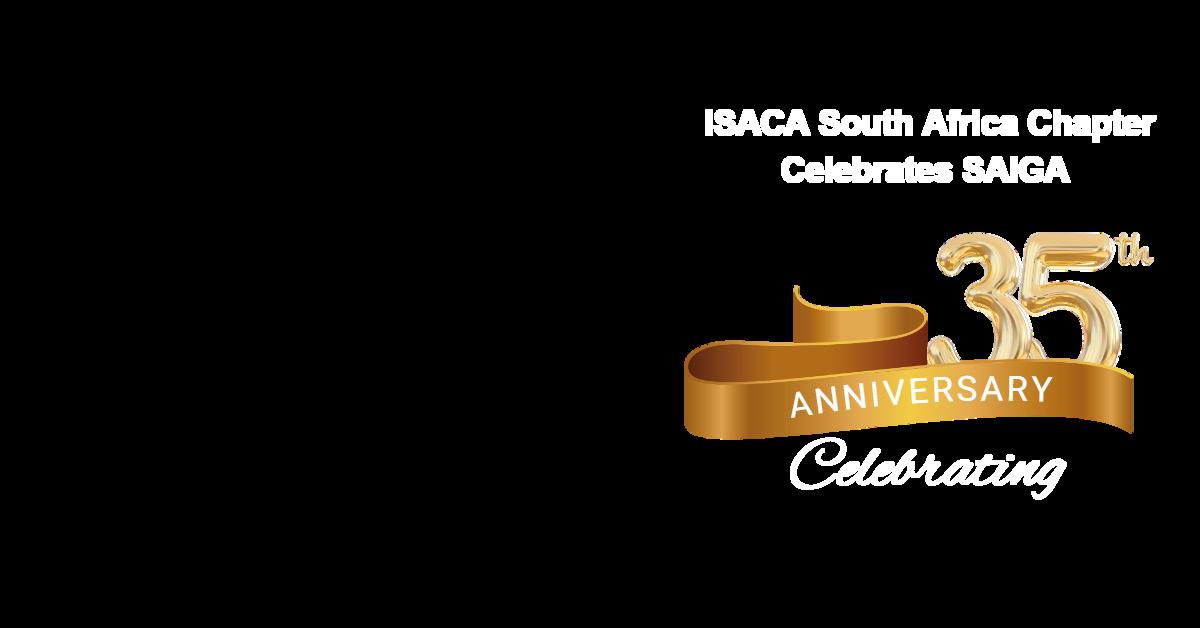
On the momentous occasion of the South African Institute of Government Auditors' (SAIGA) 35th anniversary, we join in the celebration of this remarkable milestone As a gesture of appreciation and support for SAIGA members, the ISACA South Africa Chapter is thrilled to announce an exclusive offer: a 10% discount on the ISACA South Africa Chapter Annual Conference for all SAIGA members.

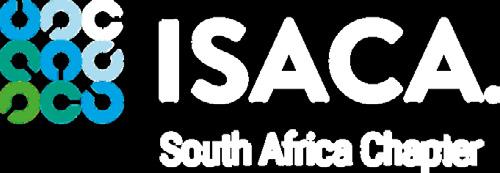

This discount will only be available from 3 July 2023 to 28 July 2023


 SEMIYOU RAFIOU Senior Economist for the Coega Development Corporation
SEMIYOU RAFIOU Senior Economist for the Coega Development Corporation
As most of us have come to learn – and experience – the South African Reserve Bank’s (SARB) latest adjustment to the repo rate, raising it by another 50 basis points, marks the 10th consecutive increase since


SARB policy tightening began in November 2021.
The rising cost of living continues to plague working-class South African households, many of whom rely heavily on salaries from businesses equally impacted by the
economic downturn and concurrent energy crisis.
All of us are feeling the economic crunch, and it is challenging for one to set aside personal concerns when analysing the country’s economic landscape.

Those who found comfort and ease in borrowing while interest rates dropped during the peak of COVID-19 just a few years ago are likely to experience shock as loan repayments reflect a marked increase.
it plays a crucial role in stabilising our country’s financial condition.
Predicting the repo rate became difficult for the SARB in its mission to maintain price stability in the country, amidst heightened food and energy prices, against the backdrop of a challenging global economic climate in the face of Russia's war with Ukraine.
Notably, the recent 50 basis point repo rate hike (475 basis points over 18 months), to 8.25 percent in May 2023, reflects a rocky recovery from unprecedented supply-side shocks, sticky inflation, and subdued domestic economic growth. Looking ahead, there are indicative signs that policy rates may stabilise and slightly improve towards the latter part of 2023.
However, this is subject to heightened uncertainty surrounding acute stress witnessed recently in global financial markets. With tightened global financial conditions, the SARB anticipates upside inflation risks, larger domestic and external financing needs, and the burden of loadshedding which may weaken currency prospects even further. As a result, the commitment to keep inflation anchored increases the likelihood of further monetary tightening and casts a shadow over any silver lining in the near term.
The first economic quarter performances of the country, published by Statistics South Africa (Stats SA), show growth, against some predictions of the market, to avoid a technical recession. This performance is due to the rise observed in the manufacturing, mining and quarrying, construction, and transport industries, and makes it hard to project future performances with an acceptable degree of confidence.
To put this into context, the repo rate is a short-term monetary policy measure controlled and managed by the SARB, and while its increase is as unpopular as it is unpleasant,
The repo rate typically affects monetary components such as the cost of borrowing, the value of our currency, and mortgage rates, which in turn, affect the broader economy. With higher repayments on loans, consumers have less disposable income to channel back into the economy.

Considering the prevailing economic conditions in South Africa, individuals can take straightforward steps to adjust their finances:
Budgeting: creating a realistic budget, focusing on essential expenses, and cutting down on >

Withhigher repaymentsonloans, consumers have less disposableincometo channel back into the economy.
discretionary spending can help you navigate financial challenges; Debt management: evaluating and managing existing debts, renegotiating terms where possible, and exploring debt consolidation options can provide relief and improve financial stability;
Savings: prioritising savings, building an emergency fund, and exploring investment options can provide a safeguard during upcoming financial uncertainties.
While additional revenue generation, or entrepreneurship, might be a step in the right direction, it is important not to lose sight of the impact of the energy crisis and rampant inflation. Private total investment growth is still lagging as the current energy crisis, characterised by frequent power outages, supply chain challenges and rising costs, has had a significant adverse impact on small businesses in South Africa.
The lack of a reliable power supply disrupts production processes, hampers service delivery, and increases operational costs. Small businesses often struggle to afford alternative energy sources, resulting in reduced productivity and potential revenue losses. Moreover, inflation poses additional challenges for small businesses.
Higher input costs, including
raw materials, fuel, and utilities, squeeze profit margins and limit investment and expansion opportunities. Small businesses also face challenges in passing on cost increases to consumers due to competitive pressures and limited pricing power, which can further impact their profitability.
The key would be to focus energy on revenue streams that would require minimal capital input and operating costs. Think about what you’re good at and how you can turn it into a profitable small business venture, for example, a knowledge-based service such as consulting.
Despite the challenges, small and medium businesses continue to show significant resilience. According to McKinsey and Co, small businesses in South Africa contribute close to 60 percent of the country’s gross domestic product and have the potential to significantly alleviate the high rate of unemployment in the country. Although high costs present significant barriers for the small business community, entrepreneurs are working more efficiently to overcome challenges by adopting technologies that are critical to their success.

For a larger organisation like the Coega Development Corporation, adapting to the current economic outlook requires agility. While
Coega is a state-owned entity, the organisation has formulated a strategy intent on achieving financial sustainability and while the organisation has its own controls in place to weather the fiscal storm, each business unit has a role to play in terms of generating additional revenue towards its sustainability strategy.

Despite the economic downturn, Coega continues to see silver linings, having secured a doubledigit number of investors in the fiscal year 2021/22. The 2022/23 financial year results will be available following an official audit of the Integrated Annual Report 2022/23.
The role of economists and analysts in the Coega Development Corporation’s Research Unit remains to provide insight and foresight to the organisation in attracting domestic and foreign direct investment into the Coega Special Economic Zone. Indeed, the organisation’s Research Unit has a qualified team, with an extensive depth of knowledge pertaining to global and local economic issues, ranging from senior and junior quantitative economists and analysts with years of experience in economic research, economic impact studies as well as data analysis.
Aligned with the organisation’s vision of being a catalyst for the championing of socio-economic development, and the strategy of achieving financial sustainability, the research unit contributes to its revenue generation by providing technical and advisory services to external stakeholders through the Coega Development Corporation external programmes.
In conclusion, whether your perspective is drawn to individual circumstances or a business outlook, the steps shared in this article may apply to varied degrees.







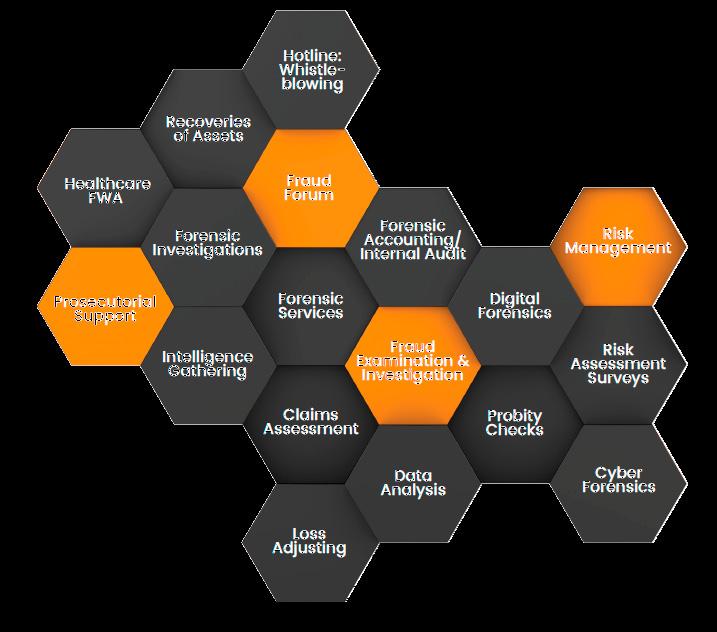
In March, Finance Minister Enoch Godongwana granted a partial exemption to Eskom from section 55(2)(b)(i) of the Public Finance Management Act (PFMA) and Treasury Regulation 28.2.1 for a period of three years.
The cited provision of the Act requires that the board of Eskom must, within five months of the end of the financial year, submit an annual report and annual financial statements to the Auditor-General, the National Treasury and the minister responsible for it, i.e., Minister of Public Enterprises.
A set of the said financial statements and the annual report must include any major losses caused by criminal


ENHANCED TRANSPARENCY AND ACCOUNTABILITY THROUGH CITIZENCENTRIC FINANCIAL REPORTING
activity, as well as any irregular expenditure and fruitless and wasteful expenditures that occurred during the financial year.
As expected from rational readers of financial statements and annual reports the partial exemption was met with public outcry, especially since citizens were never informed prior to approval.
Embarrassed by its decisions, the National Treasury later requested citizen comments, allowing people to express their views on Eskom's application.
Interested citizens affected by this decision promptly responded and, following due consideration, the minister reversed his decision,
rejecting Eskom's plea for a partial exemption.
Why was the exemption by the minister inappropriate?
The National Treasury stated that “by allowing Eskom to report on irregular and fruitless and wasteful expenditure in its annual report and not in its financial statements, the National Treasury ensures that reporting transparency and accountability is not compromised and still made public as currently required, while mitigating the risks that could arise if these transactions are reported in the annual financial statements.”

Interestingly, the Eskom board chairperson, Mpho Makwana, stated in his application that the independent external auditors issued a qualified audit opinion due to a range of issues such as:
• inadequate systems of internal control to timeously detect and record irregular expenditure, and fruitless and wasteful expenditure;
• inadequate controls to ensure appropriate assessment of expenditure arising from violations of supply chain management processes, investigations and tracking of internal audit and forensic report findings;

• some incidents that were previously logged for assessment were removed without tests being adequately conducted;
• expenditure amounts not always corresponding with underlying supporting documentation.
This article cites only four of the nine reasons mentioned by the Eskom chairperson. These four reasons are cited as they are of utmost relevance to this article.
Reflecting on the difficulties raised above, one can conclude that the reason for failing to comply with some provisions calls into question the motivation behind the application.
These explanations reflect an Eskom internal control environment that is not sound and does not support a sound and credible financial reporting process. The explanation advanced by National Treasury should be rejected because it contradicts the information presented in Eskom's application.
The risks arising from the power utility’s disclosure of its irregular expenditure mirror smoke in its transparent reporting system and rob citizens of holding it accountable as a State-Owned Enterprise, and therefore an agent of constitutional democracy.
It is inappropriate for a public body entrusted with managing citizens' funds and reporting on their use to argue in a manner that defends a public entity for simply managing risks caused by its inability to comply with rules and regulations when handling its own procurement and public finance.
PFMA also guarantees citizens that in instances where there has been non-compliance with this Act or any other applicable Act, consequence management will take place, or the accounting officer or accounting authority of that public entity will make attempts to recover such losses. >
Granting such an exemption would have meant that National Treasury encourages behaviour that is contrary to the spirit of the PFMA and sound public financial management, setting a precedent that would be detrimental to a transparent system of proper financial management, administration, and governance.
charged with their governance accountable.
Granting an exemption application only for the goal of achieving a clean audit rather than capacitating in-house internal control units, improving a system of internal controls, and reporting transparently is a criminal action, the victims of which are the citizens.
In pursuing Financial Reporting reform, the National Treasury should be careful not to deprive citizens of their rights to hold those charged with governance accountable.
Such decisions defy the very essence of the objective of the Public Finance Management Act.
of information that is timely, accessible and accurate, as outlined in chapter 10 of the constitution.
The Financial Reporting landscape allows public and private entities to disclose to the citizens, shareholders and other stakeholders the affairs of such entities, including their business strategies, value creation processes, and the modalities which it pursues in realising their strategic objectives.


Citizens have the right to accurate, transparent information that allows them to hold accountable any entity that receives public funds. The financial statements must enable the Standing Committee on Public Accounts (SCOPA) to assist citizens in holding such entities and those
South Africa’s modern-day constitutional democracy is premised on democratic values and principles enshrined in the constitution. Fundamental to being a citizen of a democratic South Africa is the right to be served by a government that is accountable and which fosters transparency through a provision
A combination of financial statements and annual reports enables entities to communicate and disclose information related to the value-creation process. The objective of the Integrated Report, as per the International Reporting Framework published by the Value Reporting Foundation, seeks to enhance transparency and accountability, which are essential in building trust and resilience, by disclosing how legitimate needs and interests of key stakeholders are understood, considered and responded to through decisions, actions and performance, as well as ongoing communication.
Fundamental to the Standard of the Generally Recognized Accounting Principle 1 – Preparation of Financial statements is the assumption that users and citizens (own emphasis) possess a reasonable knowledge of government, its activities, accounting, and a willingness to study the information with reasonable diligence.
The standard further urges the preparers to assess the needs of considering how users with such attributes could reasonably be expected to be influenced in making and evaluating decisions.
Citizens have the right to accurate, transparent information that allows them to hold accountable any entity that receives public funds.
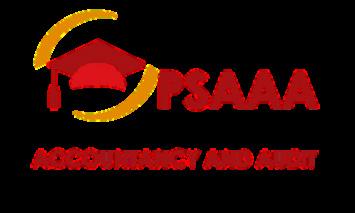


K n o w l e d g e m o d u l e s c a n b e c o m p l e t e d i n t h e f o l l o w i n g t i m e l i n e s :
1 2 m o n t h s | 1 8 m o n t h s | 2 4 m o n t h s | 3 6 m o n
N o t e : S t u d e n t s w i l l b e c r e d i t e d f o r t h e
m o d u l e s t h e y h a v e a l r e a d y c o m p l e t e d
E n t r y r e q u i r e m e n t s :
N Q F L e v e l 7 i n A c c o u n t i n g o r
A u d i t i n g
A s s e s s m e n t s
F i n a l I n t e g r a t e d S u m m a t i v e
A s s e s s m e n t ( F I S A )
E x t e r n a l I n t e g r a t e d S u m m a t i v e
A s s e s s m e n t ( E I S A )
W o r k e x p e r i e n c e m o d u l e s
1 0 0 w o r k p l a c e d a y s
Y e a r 1
P r o g r a m m e 1 : P r i n c i p l e s & E t h i c s o f A u d i t i n g
8 8 M u l t i - m o d e l ( 1 8 c l a s s r o o m d a y s )
6 3 5 P r a c t i c a l s d a y s
Y e a r 2
P r o g r a m m e 2 : P u b l i c F i n a n c i a l M a n a g e m e n t
4 7 M u l t i - m o d e l ( 9 c l a s s r o o m d a y s ) 6 0 P r a c t i c a l d a y s
P r o g r a m m e 3 : F i n a n c i a l A c c o u n t i n g & R e p o r t i n g
4 9 M u l t i - m o d e l ( 1 0 d a y s c l a s s r o o m d a y s ) 6 2 , 5
P r a c t i c a l d a y s
P r o g r a m m e 4 : F i n a n c i a l G o v e r n a n c e
4 7 M u l t i - m o d e l ( 9 c l a s s r o o m d a y s ) 6 6 P r a c t i c a l d a y s
P r o g r a m m e 5 : M o d i f i e d C a s h F r a m e w o r k
7 M u l t i - m o d a l ( 2 c l a s s r o o m d a y s )
DEVELOPING CAPACITY IN THE PUBLIC SECTOR THROUGH FINANCIAL MANAGEMENT


Government initiatives to professionalise the public sector at both the political and administrative levels are best described as efforts to build state capacity.
The National Development Plan (NDP) identifies critical interventions needed to build a professional public service and a state capable of playing transformative and developmental roles.
A capable state creates an environment that is efficient, effective, and development-oriented so that its public service can have a positive impact on the lives of its citizens. The establishment of such a state should result in poverty reduction, reduced unemployment, and inequality, as well as an environment conducive to inclusive economic growth.
Public sector institutions worldwide face a profound challenge. On the one hand, their budgets are constrained as government finances face economic growth issues and rising public debt. On the other hand, they are expected to deliver the same results, if not more, under these macroeconomic conditions.
This raises the important question of how public sector institutions can maintain and develop their capacity to deliver services and strengthen their resilience when so much effort is being focused on
reducing costs rather than building capacity. To survive in a climate of economic uncertainty, public sector institutions are constantly required to adapt to these changes.
A major concern in constantly adapting is whether an institution has the appropriate cultural tools to adapt and create capacity. A crucial element in the government’s financial management reform agenda must therefore be to strengthen individual and institutional capacity in public institutions so that they can successfully carry out their service delivery mandates.


Capacity development has evolved over time from the development of individual human resources to a term that encapsulates not just individuals but also organisations and the wider society in which they operate.
The Organisation for Economic Cooperation and Development (OECD) defines capacity as "the ability of people, organisations and society as a whole to successfully manage their affairs." The United Nations Development Programme (UNDP) defines capacity >
A capable state creates an environment that is efficient, effective, and developmentoriented so that its public service can have a positive impact on the lives of its citizens.
development as the process through which individuals, organisations and societies gain strength and sustain the capacity to create and achieve their own development objectives over time.

For an activity to achieve the UNDP's requirement of capacity development, it must result in the transformation that is generated and sustained over time from within. This type of transformation involves changing mindsets and attitudes rather than doing activities.
According to a report published by the United Nations Department of Economic and Social Affairs, the phrase "capacity development” is preferred over "capacity building."

Capacity development assumes that capacity exists and can be strengthened, whereas capacity
building appears to assume that capacity does not exist.
State capacity is defined as the “degree of control that state agents exercise over persons, activities, and resources within their government’s territorial jurisdiction.”
For a democratic political system to be successful over time, a high-capacity state is critical. This applies also in the global context, where capable states are essential for the developments advocated in the Sustainable Development Goals (SDGs) and the African Agenda 2063. Without a capable state, these goals cannot be realised.
In South Africa, the government has prioritised public sector transformation in order to address people's needs through
a developmental and transformational agenda, resulting in inclusive economic growth.
The NDP 2030 clearly outlines the policy imperatives for strengthening state capacity in South Africa. They are geared towards enabling the state to respond to challenges and manage public resources effectively and efficiently to fulfil its mandate to the people of South Africa.
Chapter 13 of the NDP, “Building a capable state”, identifies five key areas in which action is particularly important:
2 3 CAPACITY DEVELOPMENT
• Stabilising the politicaladministrative interface (MEC and HoD PFM leadership): a focus on highly skilled professionals at a political and administrative level and on building a professional public service that is insulated from political patronage.
1
• Making the public service and local government careers of choice: South Africa needs to focus on building a skilled and professional public service at all levels. This means that, at junior levels, the state needs to focus on producing the skills and expertise necessary for future public service cohorts. At senior levels, recruitment and management should be based on experience and expertise.
Key enablers in achieving professionalisation. Finance activities can be intertwined with organisational culture and behaviours. Political and power relationships will have a significant impact on how finance professionals are seen, how finance activities are implemented and how information is interpreted and used.
With an increase in the frequency of economic crises, the focus must remain on improving PFM and advocating for professionalisation of the workforce. This will support governments to manage economic stability and the longterm sustainability of public finances.
Key potential advocates are:
• The accountancy profession – IFAC, PAO’s, accountancy firms

• Auditor-General concerned with the external scrutiny of government spending
• Development partners, who often provide funds to support economies
• International Monetary Fund, which may provide loans to countries during economic crises
• Investment partners who want to invest in a country
• Citizens, whose taxes are being used to provide public services
Implementation
• Recruitment
• Upskilling
Adoption
Human resources involvement
Gap analysis of skills needed
At Ministerial and senior official level
Advocacy partners: External Stakeholders
- IFAC and the profession, PAOs, development partners, IMF, investors
Legislative and regulatory: Acts of parliament or regulatory frameworks for wider PFM reforms should Include the building of capacity and capability of finance function teams and Supreme Audit Institutions
Competency frameworks
Career paths
Job profiles for senior finance leaders to drive reforms
Developing a PO framework
Partnerships with PAOs
Continuous Development and Improvement
Peer networks
Government Finance Academy
Professional training: Contracts with individuals
Work experience (on the job training)
Post-qualification training
Continuous professional development
Career paths
Reward and Retention policies
At a strategic leadership level, building finance functions in each ministry, led by a departmental CFO
Secondment opportunities
Promotion and other career opportunities as part of reward and retention
At a strategic level, building a crossfunctional finance function that has dotted line to a central treasury or MoF CFO
Building capacity needs early involvement of the HR department. Over time, an HR department could facilitate the establishment of a Government Finance Academy
A Government Finance Academy can be responsible for adoption, implementation and continuous development and improvement. It can help to:
build the long-term talent pipeline to support the finance workforce integrate the training programmes into departmental and individual job descriptions facilitate movement of staff between departments advise on salary, performance management and retention policies help create clear career paths in finance and access to learning and development opportunities ensure that there is diversity and inclusion in recruitment and retention policies
• Improving relations between the three spheres of government: South Africa needs a shared vision across the three spheres of government. The state’s capacity deficit needs to be recognised at all levels of government and, where capacity exists, greater responsibility must be devolved in these areas while capacity in others is built.
4 5
• Effectively managing StateOwned Enterprises (SOEs): the major SOEs need effective governance structures that enable them to balance their economic and social objectives
In essence, to deal with the triple challenges (poverty, inequality, and unemployment) to its democracy, a capable South African state must have well-run institutions that regularly provide high-quality services.
What role will a local professional accountancy organisation and/or regulator play?

They can structure their learning programmes to respond to public sector learning needs and ensure that public sector content is integrated into their qualifications framework.

The PAO (Professional Accountancy Organisation) should take responsibility for the development of public sector accountancy competencies in individuals, who work in or aspire to work in PFM roles. These competencies must be based on the actual needs of the public sector, and the API Competency Framework can assist in this regard.

Incorporating public sector competencies into qualification frameworks
• Streaming: A stand-alone public sector qualification can be created. This would mean that aspiring professionals choose a private or public sector qualification at the stage of their initial application. The benefit is that the public sector qualification can be tailored to focus only on content relevant to a PFM role. The disadvantage is that it prevents mobility between sectors, and the public sector stream may be perceived by students to be less desirable than the private sector one.
• Specialisation: A postqualification specialisation in the public sector can be created. After obtaining the core professional qualification of the PAO, the accountant could enrol in a specialisation programme where they are exposed to content relevant to a PFM role. The advantage is that professionals can choose to specialise at any time in their career, and public sector content is treated as “specialised” –rather than a lower-tier option.
• Bolt-on: Public sector subjects can be added to the existing
qualification(s). This will ensure that all aspiring professionals are exposed to the public sector. The drawback is that if public sector content is delivered separately from other content, generic accountancy principles may not be understood in the context of the public sector.
• Integrated: Public sector competencies can be integrated into the existing qualification(s). Instead of bolt-on subjects, public sector content and case studies will be an integral part of the formation of accountancy competencies in the learner. The disadvantage of this approach is that it may result in too great a workload for learners.
will not only enhance PFM but will also contribute to job creation. A government may also consider reaching out to professionals in their diaspora, who have an interest in returning home and contributing to the development of their country.
As a professional body, The Southern African Institute of Government Auditors (SAIGA) represents a unique brand of professionals, the Registered Government Auditor (RGA) in the public sector and in academia. The RGA is considered the highest professional designation within the public sector auditing (previously known as government auditing).
Governments
Private accountancy firms may contribute to this process by seconding senior staff into strategic PFM (Public Finance Management) positions. Such individuals –provided they receive in-depth training in the public sector context – can drive improvements in internal controls and other PFM processes.
They can also mentor incumbents who are pursuing professional qualifications. Such secondments could form part of a public/private exchange programme where PFM officials are placed in private sector firms, in which they can receive support in developing their accountancy competencies from qualified accounting and auditing professionals.
An additional source of capacity may be from unemployed graduates. Tapping into this pool
The Institute supports the RGA professionals through Continuous Professional Development programmes, expert technical knowledge and advice, scientific research in accountability and accounting topics and other numerous programmes aimed at developing and advancing competent public sector auditing and accounting professionals.
SAIGA has issued a competency draft framework for comments, which is based on the IFAC, API, and Intosai Framework and incorporated public sector-specific matters, and it includes the technological matters for the future of the professionals in accountancy and auditing. This framework is the first of a kind for public sector accountants and auditors and it embraces the critical skills required by auditors and accountants to function in today’s fast-paced world.
Auditor-General (AG) Tsakani Maluleke has reiterated the call or the leadership in the accountability ecosystem to work with urgency and intensify the support and help municipalities to build the right controls and institutionalise the disciplines towards accountability and service delivery.
Maluleke has made this call on the back of dysfunctional municipalities, financial mismanagement, council and administrative instability, and crumbling municipal infrastructure that has marked local government.
“This leads to deteriorating standards of living and service delivery failures, resulting in service delivery protests. I firmly believe that service delivery
improvements will be enabled by capable, accountable and citizencentric municipal leadership delivering on their mandates to improve the lives of ordinary South Africans,” said Maluleke.

She also called for all South Africans to be “active participants in helping improve accountability and to hold local government accountable”.

The AG made this call to action while releasing her office’s 2021-22 consolidated general report on the local government audit outcomes.
Maluleke expressed particular concern that the state of local government is deteriorating and needs urgent attention. Municipalities are continuously failing to address issues of accountability, integrity, performance and good governance. Maluleke also noted that significant progress was made with the collaboration and support from the leadership of provincial Cooperative governance departments (Cogta) and the Treasury. Thus, while there were fewer clean audits, there were also fewer municipalities that received disclaimed audit opinions, with nine municipalities improving from a disclaimed outcome.
“If the municipalities with outstanding audits also receive disclaimed audit opinions, the improvement in this area will be less significant, but the movement of the nine municipalities should still be acknowledged,” she said.
“The support we have seen from provincial CoGTA and treasuries is what we as the national audit office have been calling for – for all stakeholders to be part of the solution in addressing challenges in local government. I commend the efforts of the provincial leadership for taking ownership, and for the support they have provided to municipalities. My plea is that this support be sustained, as it has shown to have the desired impact if we are to realise any improvement.”
If a municipality receives an
adverse audit opinion, this means that it submitted financial statements that are so unreliable that they cannot be used for oversight and decision-making. About six municipalities received adverse audit opinions in 2021-22. “There is little transparency and accountability on how these municipalities use their funds,” Maluleke continued.
“As is the case with municipalities that receive disclaimed audit opinions, national and provincial leadership and coordinating institutions should continue to offer support and, where necessary, intervene.
Of the municipalities that received adverse audit opinions, only uMzinyathi District Municipality in KwaZulu-Natal is under provincial intervention, and although this intervention began in October 2016, it has had little impact.”
However, Maluleke said she is pleased that her message on the need to eradicate disclaimed audit opinions has been taken seriously and is being at least partially heeded by the municipal and provincial leadership.
The AG is also pleased that municipalities heeded her call for financial statements to be submitted by the legislated date.
In this cycle, municipalities that submitted their financial statements by the legislated date improved from 81% in the previous year to 91%. This, she said, “was largely due to the provincial government’s concerted efforts to support municipalities as well as the impact of our enforcement mandate”.
“Where financial statements remained outstanding, we continued to reach out to all key role-players in the accountability ecosystem to intervene and we again used our enforcement mandate (as we did in 2020-21) for the non-submission of the 2021-22 financial statements at 15 municipalities. In response, we received the financial statements of 12 of these municipalities.” The AG added that her office should not be required to use its enhanced powers for the non-submission of financial statements, as this is one of the basic disciplines of accountability that each municipality must practice. The submissions are also critical and required to allow her office to do its work, which is to audit and report.
The material irregularity (MI) process is continuing to have an impact on the AG holding auditees to account where accountability has failed. In the fourth year of implementation, her office has been very responsive, expanding its work significantly by implementing the MI process at 170 auditees – up from 94 last year. According to the AG, the plan is to increase this number to 276 auditees next year.
“We have continued to see greater responsiveness from accounting officers to our MI process, and we noted that no action was being taken on 87% of irregularities until we issued MIs. The MIs we issued jolted them to desired action to address the irregularities and transgressions we raised,” the AG explained.
Through the MI process, accounting officers have taken action to prevent or recover >

financial losses of R479,56 million. Of this, R150,55 million in financial loss has been recovered, R18,85 million has been prevented from being incurred, and R310,16 million is in the process of being recovered.
The AG warned that the state of local government is deteriorating and requires urgent attention from authorities at the local and provincial levels. She repeated her call for provincial support to be intensified to help rescue the local government from this state. Municipalities must move swiftly to fill vacancies in key positions with capable and qualified officials and to provide them with the necessary support to do their work and hold them accountable.
The audit outcomes, and the insights included in the latest report, reflect the concerning state of financial and performance management, as well as compliance with key legislation in local government.

Maluleke reported that the audit outcomes were in a poor state at the end of the previous administration’s term and the new administration, which was in office for half the period under review, had little impact and, as a result, did not improve in 2021-22.
Her report reflects on the audit outcomes of local government and presents observations and insights from the audits of the financial year ended 30 June 2022, which covers the first year of the current administration.
For the year under review, municipalities had an estimated
expenditure budget of R487,12 billion to operate and deliver services.
The audit office’s annual, regularity outcomes are based on audits of the financial statements and performance reports of municipalities, as well as their compliance with key legislation.

Overall, 33 municipalities have a better audit outcome than they did in 2020-21, while 29 have a worse outcome.
Maluleke expressed concern that the number of clean audits decreased, mainly due to the instability that occurred with the transition to the new administration. She also expressed concern that internal performance disciplines

are not institutionalised – when a political transition occurs, the administrative functions must continue to fulfil their duties.
Municipalities with a clean audit status managed 29% of the expenditure budget of local governments. Two metros fall into this category, namely City of Ekurhuleni (Gauteng) and City of Cape Town (Western Cape).
The total number of municipalities with clean audit opinions decreased slightly, as more municipalities lost their clean audit status than improved to clean audit status.
The regressions were due to instability in key positions, as well as inadequate monitoring and review of controls relating to compliance. The Western Cape continued to lead with the highest number of municipalities with clean audit opinions.
Overall, there has been little change, but the report highlights the pockets of improvement and the actions the government has initiated to drive change as a message of hope for better outcomes and the resulting impact on the lived realities of all South Africans. It also urges elected representatives to intensify their actions towards instilling a culture of performance, transparency and integrity, and to be accountable to the communities they serve.
Local government is plagued by a number of challenges, but some of the root causes require urgent attention to realise wholesale good governance. These include: Inadequate skills and capacity: Limited skills and capacity in finance, information technology and technical units (which are responsible for infrastructure projects) led to municipalities
relying heavily on consultants.
Vacancies and instability in key positions such as those of municipal manager and chief financial officer contributed to the limited improvement in audit outcomes and to delays in dealing with MIs and other transgressions.


Governance failures: A lack of institutionalised financial and performance management controls continued to leave municipalities ill-prepared to operate optimally during times of change and instability. Instability and disruption in councils, along with ineffective municipal public accounts committees and disciplinary boards, continued to limit the effectiveness of governance processes. Audit committees and internal audit units did not have the required impact, mostly because their recommendations were not implemented. >

The interventions and support initiatives provided by some of the coordinating institutions, and the reporting by the members of the executive council for local government to provincial legislatures, also had limited impact.
Lack of accountability and consequences: Equally important as appointing skilled officials is the need to ensure that they are disciplined and held accountable for their performance to create a culture that values excellence and supports continuous improvement.
Limited, or even no, action was taken against municipal officials and leadership for wrongdoing and poor performance. This can most clearly be seen where councils did not deal effectively with unauthorised, irregular, fruitless and wasteful expenditure, and where municipal managers and senior management took limited action in response to our findings and to allegations by other parties of possible fraud, non-performance and the abuse of the supply chain management system.
The AG expressed concern that the government continues to neglect service delivery to the detriment of institutions. She made a call for leaders to closely monitor municipalities’ performance against their stated targets and to ensure that these targets are measurable and will have the desired impact on service delivery.
“We continued to see municipalities that do not adequately plan for delivering key basic services and do not report credibly on that delivery, with many also not achieving their planned targets. In addition,
accountability is hampered as there is little transparency on the true state of local government’s delivery of key basic services such as water, sanitation, electricity and housing,” she explained.
Every year, the national audit office audits infrastructure and reports to municipal managers on the status of selected infrastructure projects, as well as on deficiencies and inadequate infrastructure maintenance.

The focus is on critical infrastructure such as water, wastewater reatment, electricity, housing, public transport and roads, as failure to deliver on the promised new infrastructure in these areas directly affects the public and deprives them of the basic services they are entitled to receive.
Maluleke said that despite this, her office has seen little change and continues to identify the same issues every year.
The AG reported that her office raised audit findings on wastewater treatment plants in most of the municipalities where it audited, including two municipalities with disclaimed audit opinions.
The audits also confirmed that neglected municipal infrastructure and ineffective environmental management led to polluted water sources, including underground water, and revealed an unacceptable state of the management of wastewater treatment plants.
“In our previous general report, we reported that we had notified the municipal manager of Malutia-Phofung Local Municipality (Free State) of MIs at four of its sites, and the municipal manager of Ngaka Modiri Molema District Municipality (North West) of MIs at three sites. By 15 February 2023, we had issued notifications to various municipal managers of 24 material irregularities related to their wastewater treatment plants, with more to follow.”
Maluleke said her office had provided municipal managers and senior management with recommendations on how to improve their specific audit outcomes during the audits, and that the call to action in her latest report was aimed at the broader accountability ecosystem – in particular, at municipal councils (including mayors), legislatures, provincial leadership and coordinating institutions and their executive authorities.
The AG reports that municipalities are spending funds they have not budgeted for, which results in unauthorised expenditure. In 2021-22, 68% of municipalities incurred a combined R25,47 billion in unauthorised expenditure,with R13,03 billion being for noncash items. This means that municipalities spent money that the council had not provided for in the approved budget, or that the spending did not meet the conditions of a particular grant. Maluleke said that when municipalities adopt unfunded budgets or overspend their budgets, this shows that they are unable to
budget properly and stay within that budget. These practices not only pose an imminent threat to the sustainability of municipalities, but also perpetuate the spiral of nondelivery.
Often, the mayor and municipal manager submit a budget for spending that cannot be funded, and, in such cases, the council must ensure financial discipline by carefully reviewing and assessing the proposed budget to determine whether it is financially viable and sustainable.
“Despite the resources and support municipalities had available to enable sound financial management and reporting, their processes and controls were not adequate to prevent material misstatements in the financial statements,” the AG reported.

If the audit office had not allowed municipalities to correct the identified material misstatements, only a quarter would have produced financial statements that were reliable enough for the council and other decision-makers to use. In total, 84 municipalities (35%) relied on the audit process to identify misstatements that they then corrected to obtain an unqualified audit opinion.
In 2021-22, 220 municipalities spent R1,61 billion on consultants to help with financial reporting –an increase by almost a fifth from R1,36 billion in 2020-21. More than half of these municipalities (53%) used financial reporting consultants to provide skills that their finance units did not have. Overall, 40% hired consultants for specific skills and to
bridge a vacancy gap, while 7% used consultants purely to compensate for vacancies.
Consultants were mostly used for asset management services (34%), tax services (29%), and the preparation or review of financial statements (26%).
“When we analysed the financial statements of the 217 municipalities with audit opinions other than disclaimed or adverse, we found 56% of them to have indicators of financial strain. If not attended to, this can result in significant doubt about their ability to continue operating. By year-end, just over half of all municipalities (52%) owed their creditors more money than they had available in the bank as they continued to spend money they did not have. The total deficit in local government for the year amounted
to R11,87 billion, while 79 municipalities (36%) had spent more money than they had generated.
“As a result, municipalities were using their budget for the next year to cover their spending in the current year. At 32% of municipalities, their current liabilities were more than 50% of their revenue budget for the next year. This means that the 2022-23 budget will pay for spending that had already taken place, either in 2021-22 or in prior financial years.
This cycle is likely to continue unless municipalities reduce their spending and generate additional revenue, which is highly doubtful given the prevailing economic conditions and overall economic outlook,” Maluleke warned.

Whatever state South Africa might be in in a year's time, we will have just held our 7th general election. While it is up to President Cyril Ramaphosa to name the day, May would be the obvious month. For a start, if you wait any longer, it gets really cold and, along the coast, wet and windy. People stay at home. That said, the ruling ANC needs all the time it can get between now and election day to improve lives or at least come up with a credible undertaking to try, and to get Eskom's energy availability factor as high as possible.
PETER BRUCE
Former Editor of Business Day and currently the Sunday Times and Business Day columnist

So, I'm guessing May. For the ANC it's a compromise. The weather and Eskom are one thing. The turnout is another. Recent opinion polls show the ANC gets a noticeable bump in outcome when the turnout is relatively low. For instance, in a poll earlier this year by the Social Research Foundation the ANC gets a theoretical parliamentary
majority, or more than 50% of the vote, on a theoretical 100% turnout.
If you move the turnout to 66.05% though, the 2019 turnout, the ANC falls just below 50% and would in theory need to form a coalition in order to form a sustainable government.
It is the possibility that this theoretical coalition partner would be the Economic Freedom Fighters which has the country on edge, investors walking away and business confidence at a low. And, of course, as the election approaches, South African politics will become more strident, more divisive and scarier.
There is, though, a case for calming down. President Cyril Ramaphosa remarked at an ANC event in June that forecasts that see the party falling below 50% –and there have been a few – are simply “silly”. That confidence might not be entirely misplaced.

In2019wehad26,756,649registeredvotersbut only66.05%ofthem,17,672,851,actuallyvoted, justmorethan9mpeopledidnotvote.

That is because the opposition parties tend to campaign mainly against each other. There are exceptions – the ANC and Inkatha Freedom Party stand toe to toe in KwaZulu-Natal and the ANC and the DA are the main fight of the night in Gauteng.

And while it is true that both the ANC and the DA have smaller parties snapping at their heels, if the 2019 turnout is repeated next year it is hard to see how the result would be very much different next year than it was before. Yes, the economy has turned for the worse and Ramaphosa has not been able to find the policies to turn it around.

He remains committed to an unworkable mixture of growth and transformation, failing to understand the ways in which transformation is dependent on growth and not the other way around. But politically, it is suicide for him to elevate one above the other.
The result is that little progress is made, and the country's prospects sink even further. In most similar economies, Covid is a distant memory. In SA it is but the most convenient excuse for yet more failure and for doubling down even more on mouldy policy.
But knocking the ANC out of government in this country is still a huge task. The key metric in any forthcoming election in South Africa is turnout. In 2019 we had 26,756,649 registered voters but only 66.05% of them, 17,672,851, actually voted. That means just more than 9m people did not vote at all.
The conventional wisdom is that most of these abstaining voters are people lost by the ANC. They have >
become disillusioned by successive failures but cannot bring themselves to vote for the DA or other opposition parties.
The real fight among the opposition should be for these dormant votes but it is hard to see any of the parties seriously making any effort or headway in that regard. The ANC has been equally negligent in this regard, but you can bet your bottom dollar that it knows who these people are, and where they are, more accurately than the opposition.
Whatever the case, if even half of the absent voters in 2019 are persuaded back into the voting booth, the potential for change becomes truly immense though the direction of
change is harder to pick. The task for the political actors, though, is to get voters out on the day, whatever the weather and however expensive it may be.
For business, standing on the sidelines and anxious about the outcome, the instinctive response to all this uncertainty ahead of the vote is to try and pick a winner and throw money at it. By 2024, that lucky target will no longer be the ANC but the DA, Inkatha, ActionSA and other newer parties, including Songezo Zibi's very exciting Rise Mzansi will all be hoping for some financial support from the private sector.

The danger though is that donors
may try to extract promises of policy or favours or political behaviours in return for their money. That puts parties on the spot, and many will walk away. It is not an easy problem to resolve. DA leader John Steenhuisen's “moonshot pact” against the ANC is, at first glance a good idea but it is not surprising it is proving difficult to pull lots of opposition parties into some sort of united force, even while they retain their own identities.

Political funders here hold the key. The effort should not be to decide, now, who should lead a moonshot pact, or who might be its presidential candidate. The effort should be to get as many of the missing 9m voters back to participating again. The substance of democracy matters more than who the head of state is, and I say that as someone who will not be voting ANC next year.
What is more, the addition of 4m new (missing) voters could change our politics for the better. They stopped voting because when they voted ANC nothing happened. This time, once in the booth, they will make new choices. The big job in SA is to get those people back voting again.

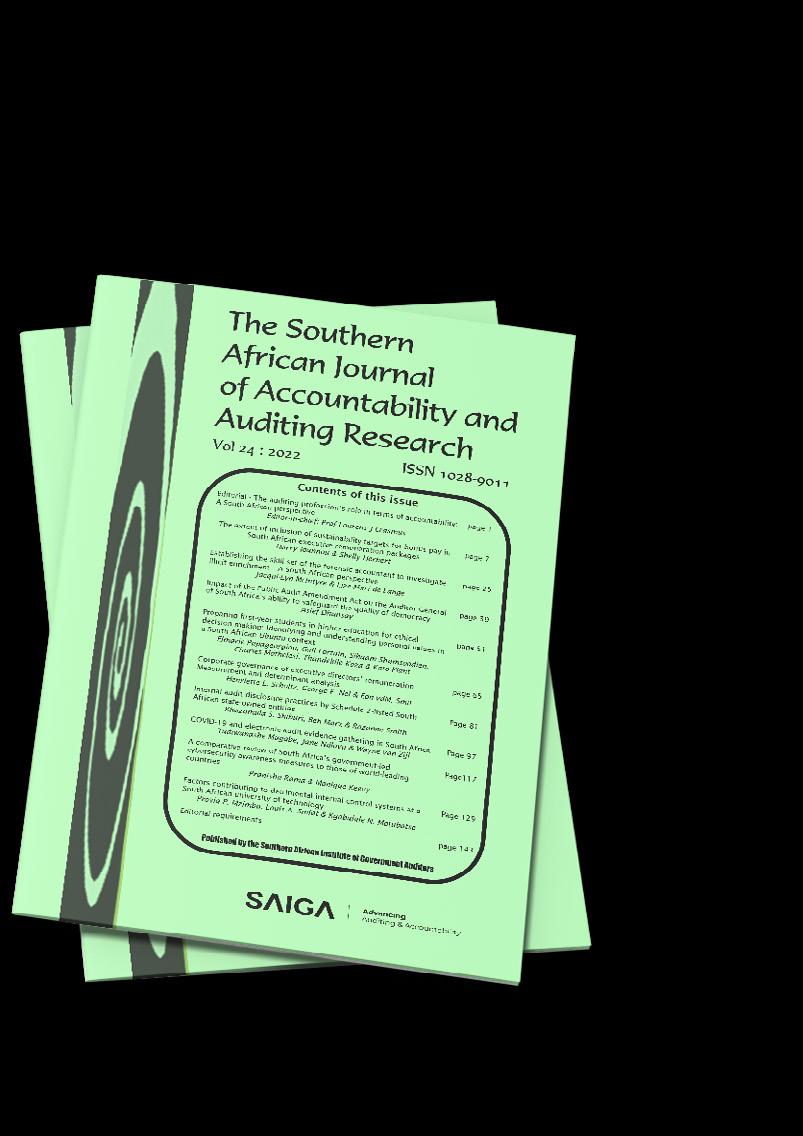
• The auditing profession’s role in terms of accountabilityA South African perspective Editor-in-chief: Prof Lourens J Erasmus
• The extent of inclusion of sustainability targets for bonus pay in South African executive remuneration packagesHarry Joannou & Shelly Herbert
• Establishing the skill set of the forensic accountant to investigate illicit enrichment – A South African perspective Jacqui-Lyn McIntyre & Lize-Mari de Lange
• Impact of the Public Audit Amendment Act on the AuditorGeneral of South Africa’s ability to safeguard the quality of democracy - Asief Dhansay
• Preparing first-year students in higher education for ethical decision making: Identifying and understanding personal values in a South African Ubuntu contextElmarie Papageorgiou, Gail Fortuin, Sihaam Shamsoodien, Charles Mothelesi, Thandekile Koza & Kato Plant
• Corporate governance of executive directors’ remuneration: Measurement and determinant analysis - Henriette E. Scholtz, George F. Nel & Eon vdM. Smit
• Internal audit disclosure practices by Schedule 2 -listed South African state-owned entities - Khazamula S. Shiburi, Ben Marx & Rozanne Smith
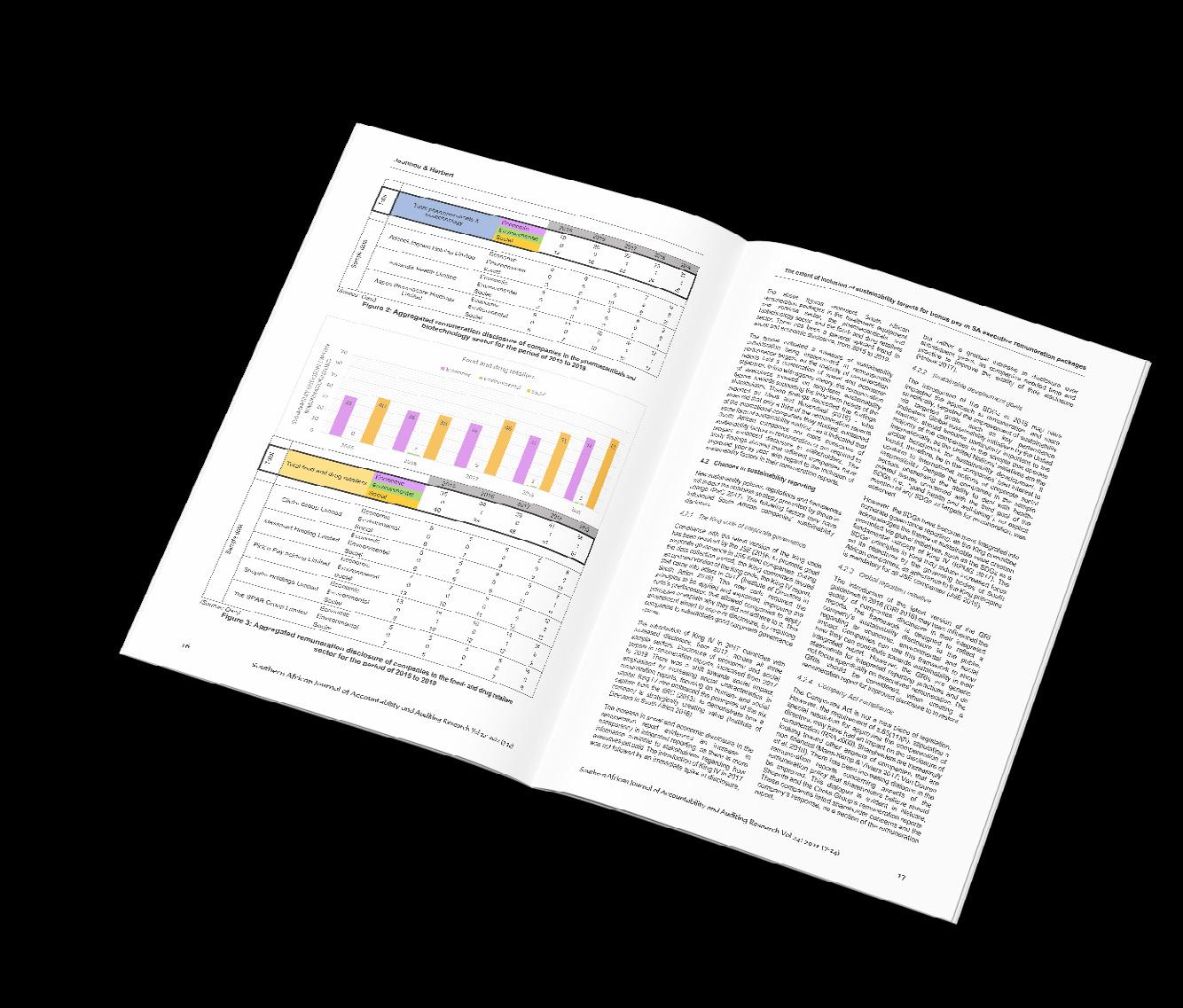
• COVID-19 and electronic audit evidence gathering in South Africa -Tadiwanashe Mugabe, Jane Ndlovu & Wayne van Zijl
• A comparative review of South Africa’s governmentled cybersecurity awareness measures to those of worldleading countries -Pranisha Rama & Monique Keevy
• Factors contributing to detrimental internal control systems


The current system of global political and economic management faces perhaps its greatest challenge since the formation of the United Nations (UN) in 1945.

It is worth remembering that the main objectives of the UN are to maintain international peace and security, to promote the well-being of the people of the world, and to enable international cooperation.
The many successes of the UN in its 78 years of its existence face possible
erosion and reversal as the world’s most powerful economies are today in a fractious state.There is an armed conflict between Russia and Ukraine, and there are insufficient voices calling for peace or working to create a stable peaceful environment.
The poor and marginalised are facing the greatest threat in that their plight is forgotten while the mighty fight. The result has been increased economic risks for the most vulnerable, low growth levels in much of the globe, and neglect of those in the greatest need.
Food inflation and high energy prices have strained incomes and resulted in high debt costs and persistent uncertainty.This is not the world many hoped for when the Cold War ended in 1991.
The poor and marginalised are facing the greatest threat in that their plight is forgotten while the mighty fight.
South Africa joins those countries striving for a return to peace, multilateralism, and partnerships for development.
We have remained focused on the vision of peace set out by former President Mandela throughout his lifetime. We have committed to playing a full role in resolving international challenges and helping countries achieve peace and security.
It is worrying that the conflict in Ukraine has diminished world attention on challenges in Africa and left the marginalised even more vulnerable to the dangers of terrorism, food insecurity, climate change, and instability.
South Africa will continue to support peace efforts and the entrenchment of human rights around the globe. We are grateful to have been elected to the Human Rights Council and will use our presence there to pursue a human rights agenda.
While joining those who seek an end to the conflict between Russia and Ukraine, South Africa, like many other countries in the world, including Africa, remains actively non-aligned. The majority of the world, in particular the developing world, remains excluded from decision-making processes in the UN, and this is deplorable.
The UN must be transformed so that it serves its role cognisant of current global dynamics. It is unacceptable that after almost 78 years after its establishment, only five nations wield disproportionate decisionmaking power in the UN system as a whole. The transformation
of the UN must include more representative, transparent and accountable organs of global governance.
The African Union (AU) represents the largest bloc in the UN with 55 members, all but one of whom (Western Sahara) are full members of the global governance body. Africa is also one of the most populous regions in the world, with a population of about 1.3 billion people. That Africa remains largely marginalised at the decision-making levels of the UN calls into serious question the legitimacy and sustainability of such exclusion.
Building a better world requires peace and stability. South Africa continues to believe that conflict resolution must not come through fuelling conflicts, but through investing in efforts aimed at political dialogue. We should aspire to peace as a global public good. There have been no winners of the wars of the past seven decades. Instead, they engendered strife, distrust among nations, divisions, a perpetual
While we work to address contemporary conflicts, we should not ignore long-standing ones such as Palestine which has been on the UN agenda throughout the seven decades of the existence of this organisation.

In keeping with South Africa’s long-term and principled support for the Palestinian people, the government of South Africa remains committed to supporting initiatives aimed at refocusing the international agenda on Palestine and the Middle East peace process.
The South African government believes that the only way to bring about lasting peace in the Middle East is to have a comprehensive and unconditional negotiated settlement to end the Israeli occupation of the Palestinian territories and Israel’s continued blockade of Gaza.
South Africa stands ready, at all times, to join the international community in the pursuit of peace, unity and prosperity. The world


Reports of a deadly outbreak of cholera in Tshwane are grim but not surprising.
Vibrio cholerae, the bacterium that causes the ancient scourge of cholera, is naturally occurring in brackish or salt water but is a fearsome pathogen that thrives in the absence of two conditions: a steady supply of potable water for consumption and effective wastewater management.


The prevalence of cholera is synonymous with great natural or physical distress, such as earthquakes, inundations or war. As expected, regions with poor water infrastructure from sheer underdevelopment are at the greatest risk of the disease.
None of these conditions prevail in Hammanskraal in Tshwane. But it has a prevalence of catastrophic failure of governance arising from the alarming
fact that an elementary municipal function has proved to be beyond the capabilities of a major metro council.
This remarkable state of affairs is the result of a set of choices that have ensured that the wastewater treatment capacity of the Rooiwal Wastewater Works is degraded and sufficient potable water supply is absent, because metro decision-makers there are either not intellectually or technically equipped to manage the water supply.
From there it is a short step to cholera or another enteric disease outbreak. Having pulled the short straw and getting cholera, the City of Tshwane has gone into full political protection mode, officiously informing Hammanskraal residents to take the matter seriously by urging them “not
to drink tap water,” as though they are the architects of their own fate for choosing to live there.
Injecting a Kafka-esque touch, the Gauteng health department sees an opportunity to demonstrate its non-existent readiness to deal with any public health emergency, other than shift bemused health workers around in a sort of improvised political pantomime orchestrated by the MEC with no proven record in public health nor in demonstrating that her presence there will ensure a swift and effective response.
That the outbreak of a primitive illness, which the Romans eradicated in their midst more than 2,000 years ago through the creation of aqueducts, occurs in an industrialised region in the most industrialised province of the most industrialised country on the continent is a pulled thread in a major unravelling threatening the country.
The successive municipal governments of Tshwane, like those in its counterpart metros, have contrived to create this appalling situation. The wilful neglect by the Emfuleni council of the Vaal water system, Africa’s second-most important waterway, presents the alarming prospect of similar outbreaks for that region, with cases registered in Vredefort and Parys.
Many more will follow, as interconnected waterways and internal movement of infected people will find a ripe breeding ground for V cholerae in dozens of municipalities where water systems have collapsed.
The families and friends of those who have succumbed are today enveloped in sorrow and grief; and they may find solace in faith and accept their loss, as fate or forgiveness would have it. But when the sorrow has eased and the grieving is done and when they realise that the deaths of their beloved were preventable and that those who
should have prevented them were otherwise engaged in the caricature of public service that masquerades as municipal government, the anguish and anger will be immense.
No, this anger may be better directed at the political establishment in the metro. They should name every previous and current councillor and those who contributed to the degradation of Rooiwal’s water and sanitation infrastructure, either because they did not grasp its importance, believing perhaps that water fairies pour buckets of the stuff into their taps, or who broke it so friends with beat-up water tankers could benefit from providing water to the residents of Hammanskraal.
To those councillors who will bristle at the accusation that they did not try to influence the presiding political authority to fix Rooiwal, well, they could have resigned and maintained honour.
After naming them, sue them, in their personal capacities and their respective parties, for causing these negligent, wrongful and unforgivable deaths. In that way, we may all have a measure of satisfaction that a blow was struck against a political elite, who, like Vibrio cholerae and SARSCoV-2, behave like pathogens, too.
But, unlike bacteria and viruses, their worst effects arise from how they lie with straight faces and cynically ignore their sworn obligation to the well-being of the commonwealth, which, as we see repeatedly, is just as deadly and kills people just as assuredly.
Meanwhile, in her findings on the 2021/2022 local government audit outcomes to Parliament, South Africa’s Auditor-General Tsakani Maluleke noted that local government institutions have continued to deteriorate. Maluleke went further to say the deaths from the cholera outbreak in Hammanskraal were
a sad reminder of the impact of continued neglect at a local government level.
“The financial position of 70 of the 241 municipalities where we completed our audits was so dire that they had to disclose significant doubt about their ability to fully operate in the future,” said Maluleke.

“These municipalities included City of Tshwane and Mangaung metros in Gauteng and the Free State, respectively, which together were responsible for 10% of the total local government budget and for service delivery to 9% of the households in the country. Incidentally, in that instance, we had actually issued a material irregularity on that Rooiwal wastewater treatment plant.”
Maluleke has reiterated the call for the leadership in the accountability ecosystem to work with urgency and intensify the support and help municipalities to build the right controls and institutionalise the disciplines towards accountability and service delivery.
She has made this call on the back of dysfunctional municipalities, financial mismanagement, council and administrative instability, and crumbling municipal infrastructure that has marked local government.
“This leads to deteriorating standards of living and service delivery failures, resulting in service delivery protests. I firmly believe that service delivery improvements will be enabled by capable, accountable and citizencentric municipal leadership delivering on their mandates to improve the lives of ordinary South Africans,” she said.
“If a municipality receives an adverse audit opinion, this means that it submitted financial statements that are so unreliable that they cannot be used for oversight and decision-making.”
Fraud, corruption and money laundering have increased alarmingly in South Africa and internationally both in the private and public sectors.
Fraud and corruption have dire consequences for business and government as it drains the funds available to organisations to fulfil their obligations in terms of strategic plans. In the public sector, fraud and corruption increase the risk to the government and its related entities from fulfilling their maintenance of delivering quality services to its citizens.
The launch of the Forensic Accountant is not the launch of a qualification or designation, but it represented the skill sets required by professionals
performing fraud and corruption investigations.
The ten Professionals Bodies, as per the standards, (see diagram A) agreed unanimously on the criteria of persons to qualify to render services as a Forensic Accountant as well as the standards that should govern the quality of the work performed. The Professional Bodies accepted the responsibility to draft the standards to ensure that those accountable for fraud and corruption can and will be held accountable for their crimes.
Ten Professionals Bodies, as per the standards:
The launch, thus outlines:
(i) the requirements and/or qualification of the person who qualifies to render fraud and corruption investigations, and
(ii) the standards that govern the quality of the accounting forensic work performed.

The qualifications required to render services as a Forensic Accountant comprise a Professional Accounting qualification/designation awarded by a Professional Body (member of the Forensic Accounting Forum (see diagram B) together with the qualification/ designation of a Forensic Examiner (ACFE).
The qualifications/designations required were developed based on the minimum requirements

of the International Education Standards (IES’s) of the International Federation of Accountants (IFAC), and that of the ACFE. The combination of these qualifications/ designations will ensure that the person has the competencies of both financial accounting and forensic examiner.
a member of both a Professional Accountancy Organisation as well as the ACFE.

• ACCA
• ACFE SA
• AGSA
• AFROSAI-E
• CIMA
• ESAAG
• IIA SA
• IRBA
• PAFA
• SAICA
• SAIGA
• SAIPA
It is therefore essential that the person certified to perform accounting investigations must be

The objective of the standards governing the work of the Forensic Accountant meets the proficiency standards of performing investigations and agreed upon engagements. The standards cover the accountability of the Forensic Accountant and the minimum proficiency standards of the procedures that should be followed when conducting the forensic investigation. The development of the standards was benchmarked against those used by international organisations including that of ACFE and organisations in USA. The Professional Bodies of the Committee for the Forensic Accountant agreed that dual membership of the Professional
Accountancy Organisations and ACFE is non-negotiable as it will ensure that the certified person will maintain their skill sets and competencies through the respective continuous professional development/experience (CPD/CPE) requirements. This also implies that the certified person will be subjected to the Code of Conduct and Ethical Code of the Professional Accountancy Organisations and ACFE independently, although there will be a mutual understanding that information about misconduct and sanctioned members between the various Professional Bodies.
In conclusion, the actions taken by the Professional Bodies to formulate the standards and requirements governing the Forensic Accountant were to fulfil the mandate of serving the public interest.

On behalf of the Board, staff and members of the South African Institute of Professional Accountants (SAIPA), I extend my warmest congratulations to SAIGA on celebrating its 35th Anniversary. This milestone represents a significant journey of dedication, and collaboration in the field of government auditing in South Africa.
As we celebrate this achievement, it is with great pleasure that I acknowledge the pivotal role that SAIGA has played in fostering a strong partnership between our two esteemed organisations. The SAIPA and SAIGA relationship has been built upon a shared vision of promoting transparency, accountability, and sound financial management in the public sector. This partnership is instrumental in enhancing the credibility and effectiveness of government auditing practices in our country.
Through our joint efforts, we have been able to elevate the standards of professional competence and ethical conduct in the auditing profession.
As we reflect on the achievements of the past 35 years, let us also look to the future with renewed enthusiasm and determination. The challenges facing our profession and the broader economy are ever-evolving, and it is through our continued collaboration that we will overcome these challenges and embrace new opportunities.



Wishing you a memorable anniversary celebration and continued success in the years to come.
Best wishes,
Shahied Daniels Chief Executive: The South African Institute of Professional Accountants (SAIPA)

